In conversation with Arif Ali (ll, 1978-82)
Arif shares some of his memories of School and how his time as a pupil helped shape his life and career.
Interview with Richard Wright
This year’s Elizabethan Club Speaker discusses his time at School and his illustrious career to date.
The Old Westminsters’ Lodge
A look into the history and skill of the stone masons who built Westminster Abbey in the 1200s.
The Elizabethan Newsletter

The Pancake Greaze
A reflection on the history of this extraordinary event

2021 / 22
All rights reserved. No part of this publication may be reproduced, storied in a retrieval system, or transmitted, in any shape or form by any means electronic, mechanical photocopying, recording or otherwise without the prior permission of Westminster School.

The views and opinions expressed by writers within The Elizabethan Newsletter do not necessarily reflect those of Westminster School. No responsibility is assumed by the publisher for any injury and/or damage to persons or property as a matter of products liability, negligence or otherwise, or from any use or operation of any methods, products, instructions or ideas contained in the material herein.
If you are receiving a hard copy of this Newsletter, it is because you missed the deadline to give us your e-communications consent. In an effort to become more environmentally conscious, we are sending the majority of Newsletters via email.
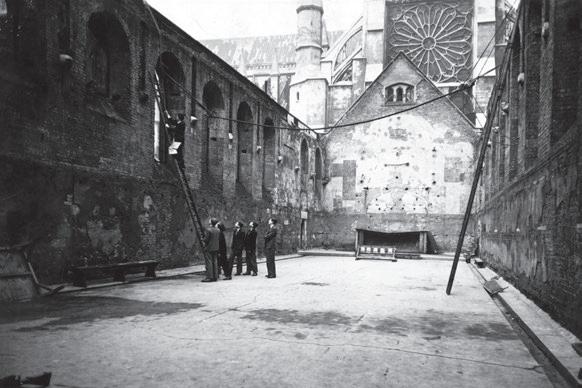
The Westminster School Development Office
Rhiannon Jones-Hopkins Alumni Relations and Engagement Manager Luke Meadows Database and Gift Administration Manager alumni@westminster.org.uk +44 (0)20 7963 1113
The Elizabethan Newsletter
Editor: Rhiannon Jones-Hopkins Design: Haime & Butler Print: Lavenham Press
Westminster School is a registered charity in England and Wales (no 312728).
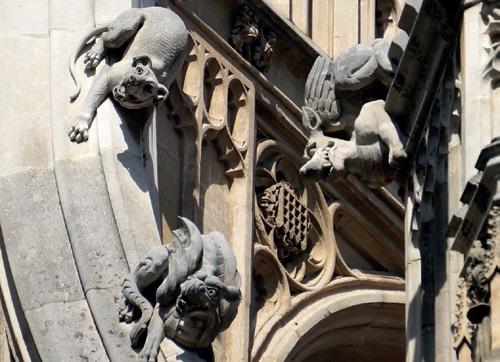

Information is correct at time of print.
Elizabethan Club Committee
Tim Woods, President (GG, 1969-74)
Jessica Chichester, Chair (GG, 2000-02)
Charles Low, Treasurer (QS, 1967-72)
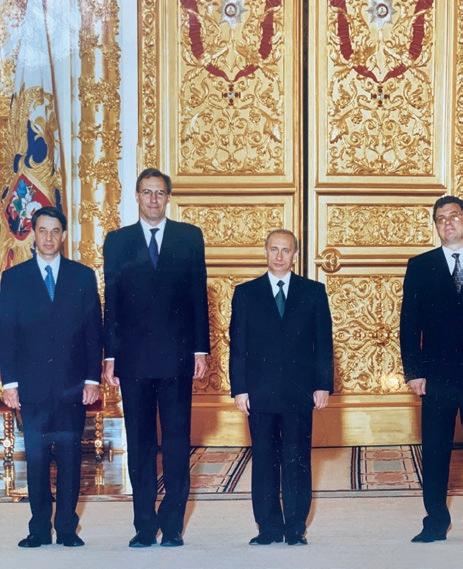
David Roy, Vice-President (AHH, 1955-61)
Nick Brown, Vice-President (RR, 1968-73)
Matthew Webb, Sports Rep (BB, 1999-04)
Artin Basirov (GG, 1989-94)
Gavin Griffiths (WW, 1967-72)
Henry Johnson King (LL, 2007-12)
Noel Watson-Doig (RR, 1994-96)
Arnav Kapoor (MM, 2010-15)

Poppy Maxwell (PP, 2008-10)
Emma-Jane Gordon (LL, 2012-14)
Oliva D’Silva (GG, 2008-10)
James Kershen (WW, 1981-86)
Paul Dunn (AHH, 1991-93)
ISSUE 2021/22 The Elizabethan Newsletter 02 03
Contents 05 04 From The Editor 04 From The Chairman 05 Welcome from the Head Master, Dr Gary Savage 07 Development report 08 OWConnect 10 In Conversation with Arif Ali (LL, 1978-82) 14 Events Gallery 17 Sports Reports 21 House Reports 22 Interview with Richard Wright 28 The Old Westminsters’ Lodge 30 Bookshelf 32 From the Archives: The Pancake Greaze 37 In Memoriam 32 22
28 17 10
Please update your preferences here, to make sure you keep receiving future Newsletters, and all relevant OW communications. Update your preferences here! www.oldwestminster.org.uk/stay-connected
From The Editor
It was a real pleasure being able to meet many of you in person at the recent events that the Club hosted in London and at School. As the world has re-opened and we are looking ahead to the 2022 Elizabethan Club Dinner, please read the fascinating interview with this year’s speaker, Richard Wright, who talks about his truly unique career on page 22. I am looking forward immensely to hearing him speak in person, and of course, meeting even more of you in the coming months.
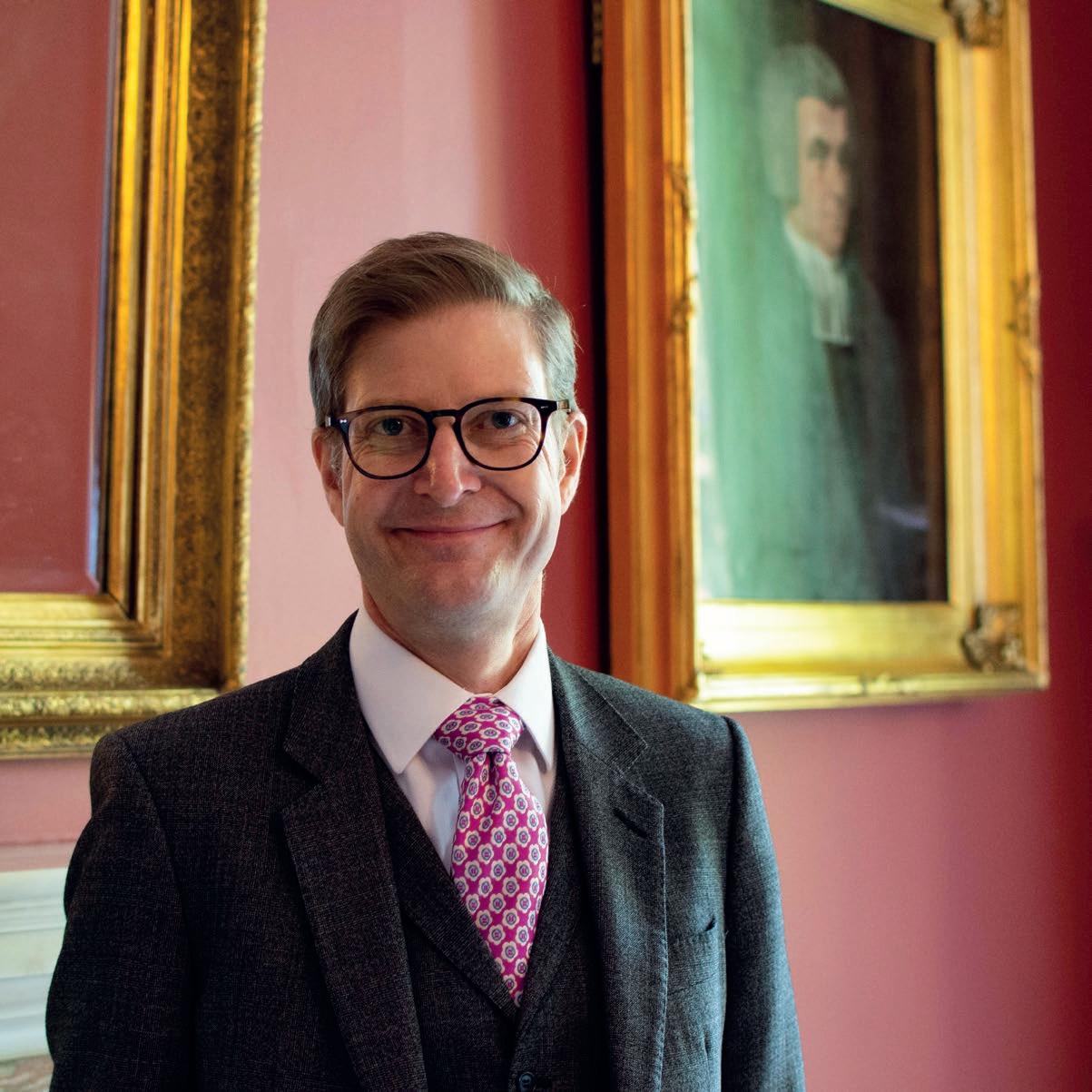
A big thank you to the Committee and to all those OWW who contributed to this Newsletter and beyond.
As ever, if you have any suggestions as to how to improve the Newsletter or any comments please do get in touch.
With warmest wishes, Rhiannon Jones-Hopkins
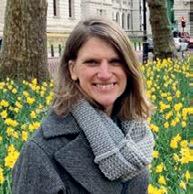
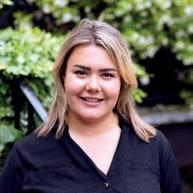
Alumni Relations and Engagement Manager rhiannon.jones@westminster.org.uk Tel: +44 (0)20 7963 1113
From The Chairman
This year is the second of my chairmanship of the Elizabethan Club and as the world seems to be finding its stride after Covid, so do and so does the Club. We have been able to hold more in person events, including the Annual Dinner in November, where David Fitzsimons, our speaker, was able to enlighten us on all things Covid following his recent visit to Wuhan as part of the WTO task force. It was fantastic to be able to hold the dinner and have Old Westminsters back together at School. It was also a great opportunity to showcase the refurbished Adrian Boult site, which was then built on by Westminster School’s archivist, Elizabethan Wells, in her captivating online lecture in March.
The Elizabethan Club’s objectives are to preserve the association between the Members and the School; to further the interests and prosperity of the School and its pupils; to promote social contact between the Members, and, with a view to such objects, to encourage sports, entertainments and social gatherings among the Members in the United Kingdom and overseas. To me, the aim of keeping in touch with or reconnecting with old friends is equally as important as networking and meeting new people. This was exemplified to me by a lunch my father hosted for his OWW friends. They rowed together at school in the early 1960s and have kept in touch and met up regularly ever since. I have a similar group of friends from my days and seeing a picture of my father and his contemporaries meeting up this year made me think, and hope, that would be doing the same with mine after all those years. Friendship is so important, which has been highlighted during the Lockdown: a call or a message or a letter can mean everything.
This year the Club are hoping to host more events, and this should further increase in 2023. For the time being, we will continue with the online lectures, which has brought back some OWW who have not been to other events. The pub nights are another more informal way of getting together with old friends or make new ones. We have also hosted the Westminster Connect event at The Ned; a different format to our usual events, which has been a great success by welcoming OWW who have not attended other events before. The Club hopes to host other events appealing to specific industries at different venues in the near future.
The year has also yielded two independent reviews; into attitudes to race and harmful sexual behaviours. The School wanted to be quick to act to address the issues and to listen to the recommendations given and make the necessary changes and the Elizabethan Club has supported the School wholeheartedly on this.
Being the first female chairman of the Club, I am proud of how far the school has come and the changes it is making, and I look forward to celebrating the 50th anniversary of girls joining Westminster.
Connecting with as many OWW as possible is a big aim for me – knowing that everyone has a different way of connecting with the school – whether it is via email, letters, OW Connect or the oldwestminster.org website – means that we need to work hard to ensure everyone who would like to is notified of events and news from the Club. Any thoughts on this are most welcome and we will be looking at how best to streamline our communications with you so that you are kept up to date but not bombarded.
Welcome from the Head Master
Dr Gary Savage
I hope this edition of the Elizabethan Club newsletter finds you well, wherever you are reading it.
The Elizabethan Club are always looking to re-connect to any OW or former staff who did not receive a copy of this newsletter. If you know of anyone who did not receive a copy who would like to, please ask them to email alumni@westminster.org.uk
Finally, I would like to thank all the committee members and Development Office for all their hard work and their support over the past year. I would also like to take this opportunity to welcome Tim Woods as the new President of the Elizabethan Club and to thank Jonathan Carey, the outgoing President, for everything he has done for the Club and in particular for his support for me as I took over as Chair.
am looking forward to a more active year on the events front and I hope to see or hear from as many of you as possible.
Jessica Chichester (GG, 2000-02)
After the lockdowns and restrictions of Covid, 2021/22 felt progressively more normal. We had lessons taking place in classrooms, co-curricular activities and domestic trips restored in full, and an energy and buzz about the place that felt reassuringly, indeed inspiringly familiar. This is not to say it has been entirely straightforward. There have been numerous absences of staff and pupils due to Covid, and until quite recently continuing restrictions around social mixing up House. Nevertheless, the trajectory has been positive, so much so that we are now able to start thinking about overseas trips again next year, such an important part of the warp and weft of a Westminster education.
Against this public health backdrop, we have also seen the publication of the independent reviews into harmful sexual behaviours and racism which I have shared with you separately. Needless to say, we are working hard to implement the various recommendations and ensure that, by so doing, Westminster is as welcoming, inclusive and progressive a ➽
ISSUE 2021/22 05 04 The Elizabethan Newsletter
place as it possibly can be. Part of that process has to be the serious consideration of the introduction of co-education across the school, something which I support and which Governors have agreed we should look at very carefully. I am conscious that the Upper School fully welcomed girls in 1973, so the fiftieth anniversary of that moment is almost upon us, and I hope to be able to share our plans for the future around that time, if not before.
In the meantime, we continue to look to enhance everything we are doing for our current and future pupils, whoever they might be. We are undertaking a comprehensive review of the curriculum and the way it is delivered, to ensure it is fit for twenty-first-century purpose both inside and outside the classroom. Embedding more opportunities for interdisciplinary learning will be a key feature of this, as will occasions to learn alongside our partner schools and universities both in this country and overseas. This is something which the new “Horizons” programme (bringing together staff and students from around the world) has already begun to explore online, and which the long-standing “Platform” programme (offering extension and enrichment classes for local children in state schools) achieves brilliantly on-site. Finding ways to bring these two programmes together is another exciting challenge for the months ahead.
We are also continuing to invest in our facilities insofar as resources allow, with the sports pavilion undergoing a major refurbishment, and the Fields themselves given a full overhaul to ensure drainage and irrigation is as good as it can be. Regrettably, this means Vincent Square is out of action for much of the next academic year; but the result will be a playing surface which can be used reliably all-year round in the future. I am exceedingly grateful to everyone who has expressed a willingness to support us in the financing of these and other capital projects, and of course with our major fundraising efforts for bursaries, whether immediate (the Bursary Fund) or endowed (The Ben Jonson Foundation). This is the only means by which we can hope, in the fullness of time, to make a Westminster education available truly to anyone who would benefit from it, and I am grateful for all your support. ■
Floreat.
DEVELOPMENT REPORT
After a second challenging year, thankfully life is returning to normal with us being able to host events in person and no longer being 100% reliant on Zoom to engage with you, our most valued community of Old Westminsters. Thank you again for your understanding and continued support.
The last few years have seen the appointment of a new Chair of Governors, a new Head Master of Westminster School and a new Master of Westminster Under School. With this change of guard, the Charity has set its course to transform the School to ensure its continued leadership for the years ahead.
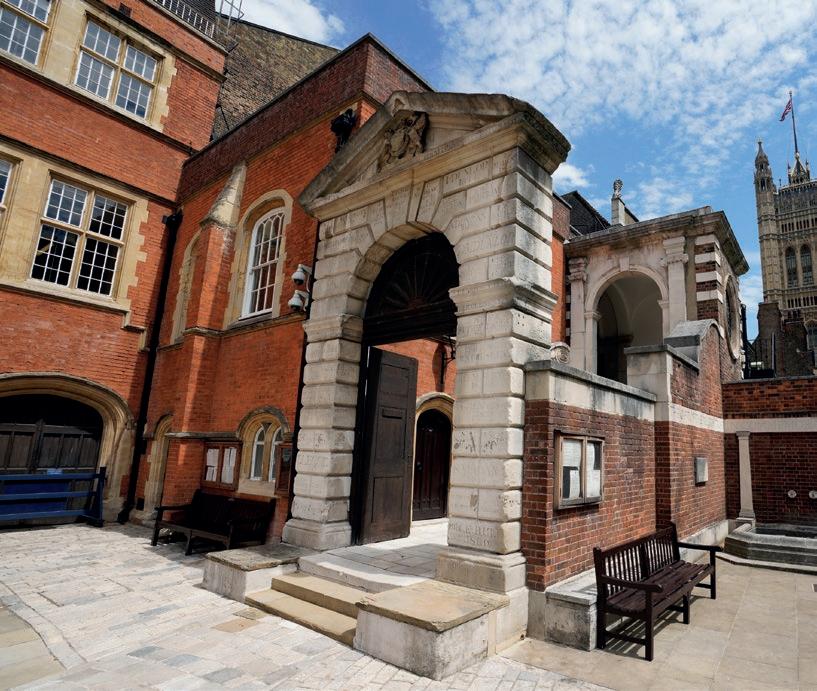
However, transformation comes at a price. As a charity, we now need your support as Old Westminsters and the support of the wider Westminster community to help us to raise the necessary funds. Obviously, we would be delighted to discuss details with any OWW who would like to know more. We will be sharing more information over the coming months and years on how you, as an OW can support the School to evolve and improve.
In short we respectfully ask for your financial support to help us to fund the below areas:
How to donate
Go online to make a regular or one-off gift: support.westminster.org.uk
To find out more and/or discuss how to give via our US or UK Foundations or how to leave a Legacy to the School please email: developmentteam@ westminster.org.uk
Bursaries
Transforming lives is core to the ethos of Westminster School, and there are two funds to donate to:
The Bursary Fund: each year we need approximately £1.5M to fund the current bursary pupils.
The Ben Jonson Foundation: an endowment fund with a target of £50M with the aim of using the return on the invested capital to fund the bursary places in perpetuity.
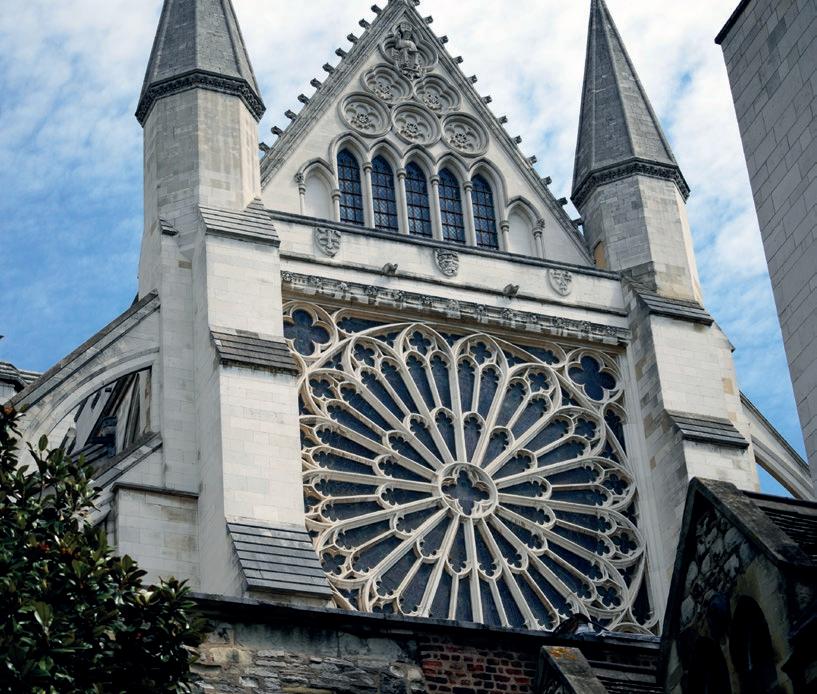
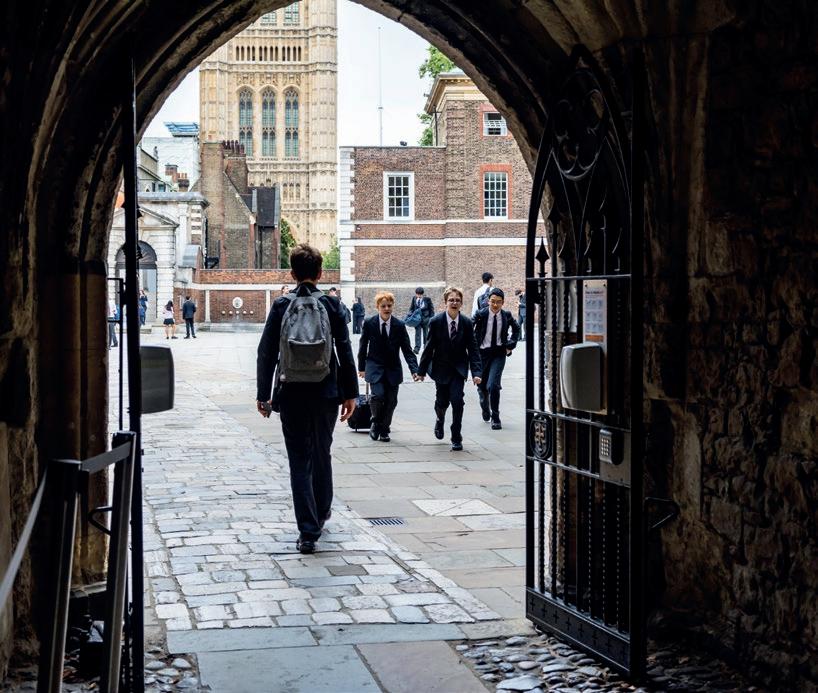
The George Herbert Fund
In support of current pupils whose family has unfortunately suffered financial hardship meaning that without your support, the pupil may need to leave Westminster which as a School and Charity, we never wish to happen.
Capital Projects
Transforming the experience
Vincent Square Fields and Pavilion: We need approximately £5M to renovate and extend the pavilion plus to install drainage for the fields to avoid the fields being waterlogged for months on end as many of you may recall!
Others to be announced in the coming months.
We would also like to thank the Old Westminsters who have kindly and most generously supported our fundraising activities. Your continued support means that Westminster can continue to widen access and provide a world class education to its pupils.
Thank you again for your support and we very much look forward to meeting many of you at our events in the coming year.
The Elizabethan Newsletter 06 07 ISSUE 2020/21
OWConnect
“Having moved to a new city (and country) just before the global pandemic, it was such a relief and support to find a fellow OW not too far away, through OWConnect. Several months (thanks to the lockdown) after first connecting on the platform, we finally managed to meet in person and share a coffee and memories of Westminster!”
Connect and engage within the Old Westminster community www.owconnect.com
OWConnect is our one-stopshop for everything Old Westminster! Here, you can re-engage with friends, colleagues and classmates from your past as well as make new connections for your future.
What can OWConnect do?
Careers and Mentoring: Find your own mentor in a variety of industries and companies, or offer to mentor a younger OWW. ▼
Album: Share your photographs from events, reunions or snaps of questionable fashion choices back in your school days.
Directory: Search the network for OWW in your local area, somewhere you’re travelling to or somewhere you’re moving to –You can also invite your own OW connections (from Facebook and LinkedIn) to the platform, if they have not already joined. ▼
This incredible network is also available through your mobile device, with the OWConnect app able to be downloaded through the GooglePlay and Apple App stores. Search for the ‘Graduway Alumni App’ and download to your device, type in OWConnect in the institution drop-down box and sign in!


Groups and Societies: Join any OW society, house society or group by simply indicating your interests at registration. All groups are easy to see, showing you what opportunities there are to get involved with your Westminster community. Don’t see a Society that you’d like to be a part of? Start one up!
Jobs: Search for new career opportunities and apply directly within the platform. Or, recruit for your own company within your Old Westminster network.
Social Media: See all the School news from all the social media channels, in one central location.
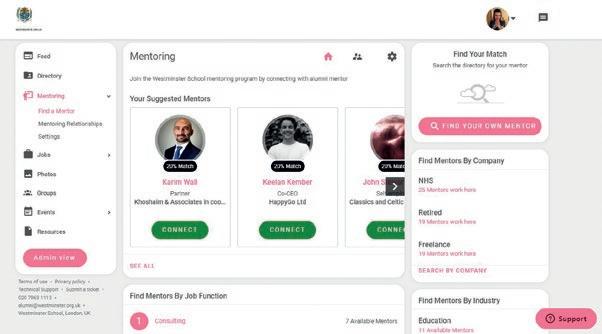

Events: Register for events quickly and easily with a simple booking system, or organize your own pub night through the platform.
Give Back: OWConnect provides a simple way to give back to the School, either through volunteering or through philanthropic donations.
*NEW* Business Directory: Perhaps you are in need of a graphic designer for your company, or are looking for opportunities for a career change. The Business Directory is an easy way to search through the OWW network to find connections across a multitude of disciplines.
ISSUE 2021/22 09 08 The Elizabethan Newsletter
Over 2,400 OWW and former staff are now registered on the platform – why not join them and experience our global Old Westminster network for yourself!
In Conversation with Arif Ali (LL, 1978-82)
Arif Ali (LL, 1978-82) was recently named ‘Most Innovative Legal Practitioner in North America’ by the Financial Times Here he shares some of his memories of School and how his time as a pupil helped shape his life and career.

What brought you to Westminster?
The short answer is, a very dear uncle who believed in me and who felt that Westminster would be an excellent school where I might realise my potential. My parents had never heard of Westminster, but given their circumstances at the time, they were open to all suggestions. Soon after the civil war between East and West Pakistan, my father had taken a job with Royal Dutch Shell and had been posted to Brunei. As the educational options in Brunei were essentially non-existent in the mid-seventies, I was sent to a boarding school near Dover; I still have no idea how my parents found that place. The school had never sent a student to Westminster and the headmaster was quite insistent that I wouldn’t get in. My uncle felt otherwise, and so I swotted, travelled to London, and took the exam Up School with many other hopefuls who had probably been prepping for the exams since they were toddlers.
I don’t think passed most of the papers, but I do recall the interview going really well, and perhaps the English exam. still remember running down the hallways whooping with joy when I received the news I’d been admitted. A day that my life changed in ways that only my uncle had imagined.
What are some of your favourite memories from your time at Westminster?
loved the house that I was in, Liddell’s. All of the boys were pretty friendly towards each other, competitive, hardworking, and generally good fun. Our matron was tough, but also very caring. She got me through a lot. And the ladies who looked after the house and the kitchen, could have been stars in their own sitcom. The food wasn’t great, although I did quite like the Sunday lunches. loved playing school and house sports, and maths classes with Tristram Jones-Parry, even though he petrified me. Oddly enough, also really enjoyed Latin Prayers. And perhaps top of the list were the occasional visits to John Rae’s office to receive a Roman coin (denarius) for some sort of academic accomplishment or the other. I still have mine, which have been made into cufflinks.
Did you have a mentor at the School either a pupil or teacher or both?
The person who I could best describe as a mentor amongst the faculty was David Brown, my house master at Liddell’s. I really wasn’t ready for Westminster when I arrived. Mr. Brown (he’ll always be Mr. Brown to me) spent a lot of time helping me to develop
confidence, pushing me to get involved in school and house activities, and picking up on when I was feeling homesick. The other person who had a huge influence on me was my best friend and roommate, Chris Cooper. Chris and his family welcomed me into their home and I have the fondest memories of weekends at the Coopers, with amazing Sunday lunches, afternoons at the Odeon in Swiss Cottage, dancing to Elvis and the Beatles, or just hanging out with Chris and his sisters. The love and generosity in the Cooper home greatly influenced the type of atmosphere that my wife and I have tried to create in our home.
Was the atmosphere at the school an inclusive one then?

Westminster wasn’t particularly diverse while was there. There were very few women and hardly any people of colour. But, I don’t recall feeling “not included” because of my ethnicity. That said, did often feel quite conspicuous given that I didn’t come from a monied background.
What extra-curricular activities, if any, do you remember enjoying both participating and watching?
I was very active at school. I played a lot of sports: football, cricket, fives, squash. I also directed a play and acted in a few plays. In fact, my performance as the “lugubrious hound” in the Latin Play even got a line in The Sunday Times. The one regret I have is not participating in the Pancake Greaze on Shrove Tuesdays, one of Westminster’s most enjoyable traditions, amongst many.
What was the naughtiest thing that you did at school that you are prepared to admit?
The list of “naughties” is probably longer than would want my children to know about. At the top of the list of what I’d be prepared to admit to publicly would be racing in The Cloisters at night, or sneaking out for cup of tea and a bun at a food van that would be parked just off Victoria Street. There may occasionally have been some tobacco involved as well.
How did you end up in America?
A few factors motivated the decision, first and foremost, that my parents and my much revered uncle felt that I would have better job prospects in America. The late
70s, early 80s were not the easiest of times for South Asians and other immigrants in the UK. Unquestionably, the situation is far better today, but back then my family felt that America would be more open and accepting, a land of opportunity. I also completely blew my “A” Levels, so, as has been the case for many, America provided me with a fresh start. As things have turned out, America has been very generous to me and my family. loved the American system of higher education and wouldn’t swap my time at Columbia University where I received my undergraduate degree with highest honours (and met my now wife of 33 years) or my time at NYU Law School for anything. That said, if I look back on my career and who I am as a person as a result of the work ethic I developed and the values I was taught at Westminster, I’m sure that if I’d stayed in the UK, things would have turned out just as well.
What are some of your career highlights? Right out of law school, in 1990 I joined an international law firm in Washington D.C. where I was able to work on two massive nuclear power plant-related international arbitrations. witnessed some of the most skilled trial lawyers practice their craft. In 1993, I was invited to join the United Nations Compensation Commission (“UNCC”) in Geneva, Switzerland, which is a specialized organ of the UN Security Council that was set up to address the 2.2 million claims arising out of Iraq’s 1990 invasion of Kuwait. I ended up heading one of the UNCC’s claims divisions. I then moved to Paris to join Freshfields Bruckhaus Derringer’s highly-regarded International Arbitration and Public ➽

11 ISSUE 2021/22 10 The Elizabethan Newsletter
Never underestimate yourself. You wouldn’t be at one of the most storied and oldest institutions of academic learning in the world if some of the most accomplished educators on the planet didn’t believe in you.
Columbia University
International Law Group. In addition to working on various international arbitrations around the world, I was one of the lead associates in Freshfields’ representation of the Kingdom of Bahrain in its land and maritime dispute with Qatar before the International Court of Justice.
The most fascinating aspect of that matter was the investigation that I coordinated to prove that Qatar had submitted more than 80 fraudulent documents to the ICJ in support of its territorial claims.

In 2001, following my return to the United States, I continued my international practice, and have represented private parties and sovereign states in disputes relating to some 30 jurisdictions around the globe in a variety of sectors ranging from mining and oil and gas, to hospitality, to construction, to information technology. For the past 15 years, I’ve led the international disputes practices of some of the world’s largest law firms and have had the good fortune of working with immensely talented lawyers, including some who were Westminster alumni. I hired them! In addition to my practice as counsel, I also often sit as an arbitrator.
Tell me about the case for which you won the Financial Times’ 2021 Award for Most Innovative Legal Practitioner in North America?
2021 was a truly remarkable year in which I was fortunate to win a trifecta of legal industry awards: the Minority Corporate Counsel’s Rainmaker Award, BTI’s Client Service Award, and then the holy grail FT Award for Most Innovative Legal Practitioner. My sense is that I received this award based on having won a string of high stakes international arbitrations and, in particular, several international arbitrations against the Internet Corporation for Assigned Names and Numbers (“ICANN”) over the delegation of top-level domains such as .WEB, which is considered in the industry to be the best alternative to .COM.
The first case I won against ICANN involved an adult content top-level domain, in which we were able to convince an arbitral tribunal chaired by the former President of the International Court of Justice that international law applies to the governance of the Internet, in addition to relevant domestic laws.

Is there one case or experience as a lawyer that you could point as a defining moment in your career?
I don’t think there’s been a single defining moment. Each new client representation has its own complexities and nuances and hence teaching and learning moments.
Probably the case where I learned the most about client service was one at the beginning of my career involving the representation of Bahrain before the ICJ, for which was decorated by the King of Bahrain with the Order of Bahrain.
The case where feel my limits have been tested and extended in terms of playing a multi-dimensional chess game involving domestic court litigation, international arbitration, political advocacy, and public relations is one on which I am currently working. We are representing a Hungarian oil and gas company against the Republic of Croatia in a multi-billion dollar dispute involving allegations of
corruption against our client’s chief executive officer and the expropriation of the client’s investments in Croatia. The stakes could not be higher. Although not a case as such, I feel that my work for the UNCC may have had the most meaningful humanitarian impact. Through the work that we did, we were able to help millions of people and set precedents and procedures that may eventually serve to help the victims of Russia’s aggression in Ukraine and millions of others in other jurisdictions. My UNCC experience is one to which I often turn to remind myself that whatever I do as a lawyer should have an impact that is meaningful and lasting.
Has your connection to Westminster been helpful in your evolution as a leading lawyer internationally?
Absolutely. For starters, the School is known and respected around the world. Being a Westminster “boy” has also
allowed me to maintain a link to the UK, and a certain acceptance within the legal community, which has many Westminster alumni. More so than my connection to Westminster, it’s what Westminster taught me that has stuck with me and helped me to develop my practice and the international standing I’ve achieved. And what is that? It’s the importance of believing in the potential that people have and having the self-confidence to realise that potential. As I mentioned earlier, I didn’t do very well in the entrance exam, but the school felt that I had potential. It took a chance on me, for which I will be forever grateful.

What advice would you give to Westminster students who are aspiring lawyers?
Never underestimate yourself. You wouldn’t be at one of the most storied and oldest institutions of academic learning in the world if some of the most accomplished educators on the planet didn’t believe in you. Prove them right by believing in yourself and remembering that there is no greater satisfaction as a lawyer than service to others. ■
13 ISSUE 2021/22 12 The Elizabethan Newsletter
NYU Law School
European Court of Justice
Through the work that we did, we were able to help millions of people and set precedents and procedures that may eventually serve to help the victims of Russia’s aggression in Ukraine and millions of others in other jurisdictions
Arif Ali with Lord Neuberger at OWW Lawyers Dinner
Photo Gallery
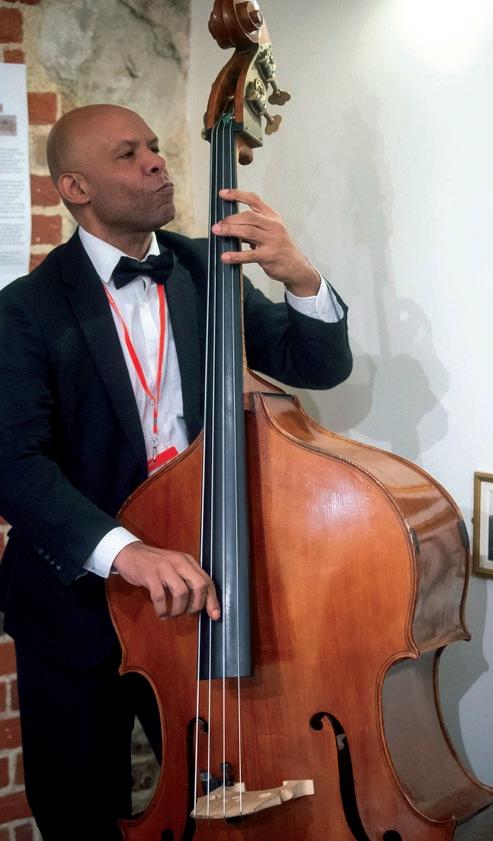
A look back at some of the year’s OWW gatherings and School events.
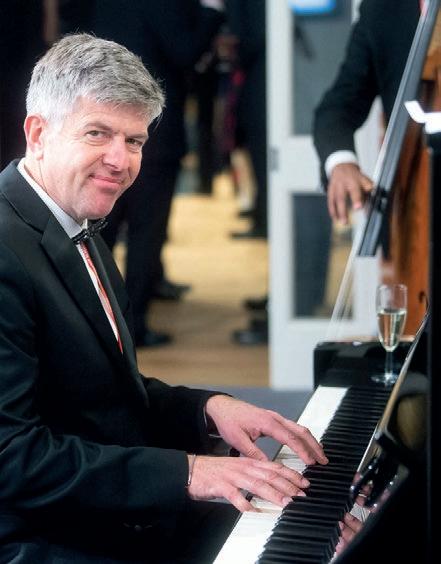
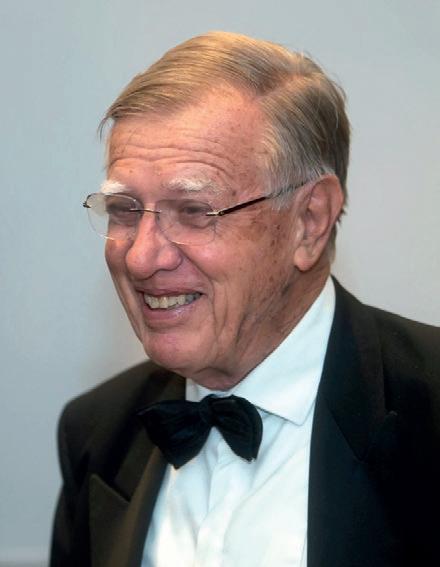


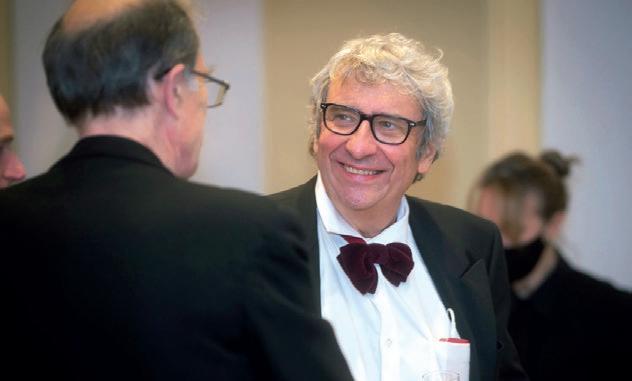

If you took some good photos at any of our OW events this year, please do send them to alumni@westminster.org.uk

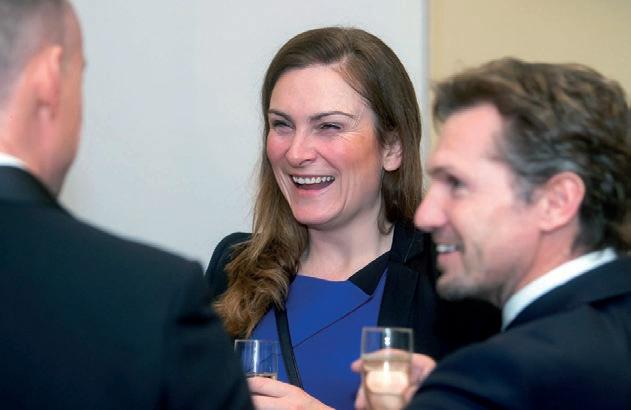
15 ISSUE 2021/22 14 The Elizabethan Newsletter
Events
PRIDE drinks at the
Pub Night at the Blue Boar
Blue Boar
Elizabethan Club Dinner
Sports Reports
Cricket
After the COVID-enforced break in 2020, OWWCC were raring to go for the 2021 season, COVID-adjusted as it was. The season began with the small matter of an away Cricketer Trophy tie at St. George’s Weybridge.
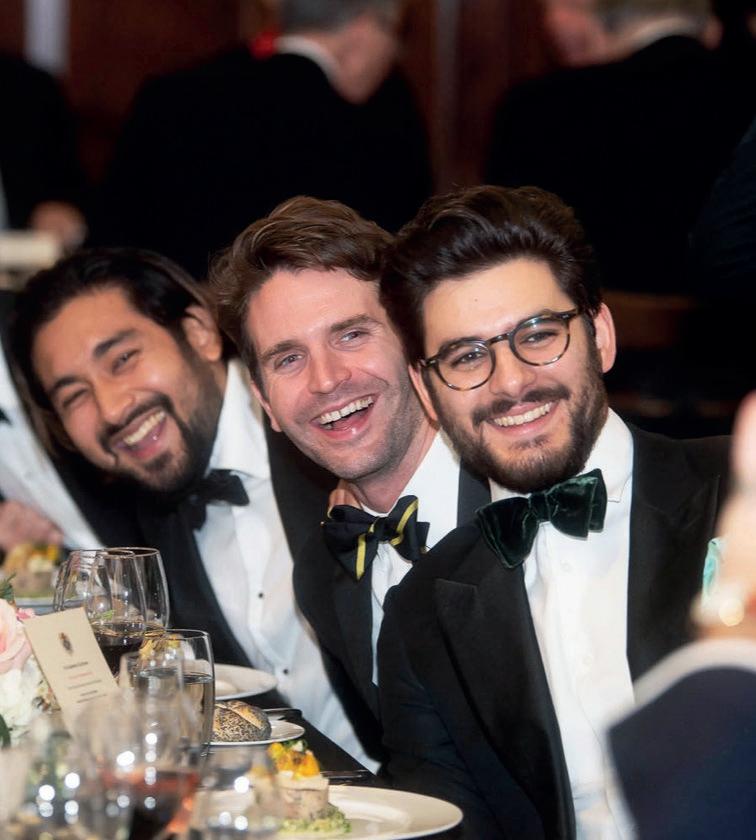
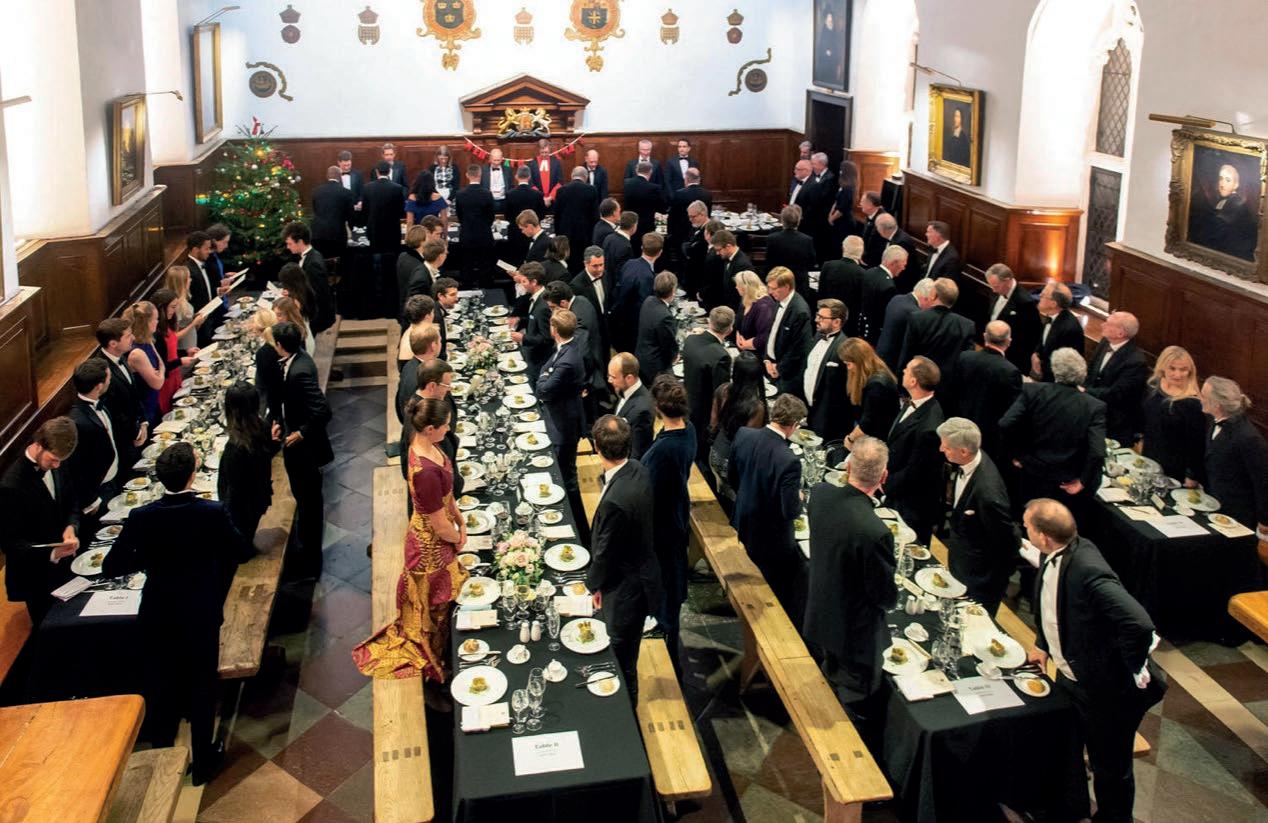
Captain Alex Scott won the toss and inserted Old Georgians on a flat track with the sun blazing down. The seamers toiled away with skill and application, enabling Scott to spin a web at the other end, taking 4-34 from his 10 overs, with OWWCC bowling OGs out for 234. The OWW chase was a professional affair, with Scott (79*), Alex Vinen (34) and Alex Stewart (42) ensuring OWWCC won with 4 overs and 5 wickets to spare.
However, ten days later OWWCC was brought back down to earth by the School. James Kershen (43) and Vinen (49*) showed well with the bat, but the best efforts of Dan Andreyev (2-33) and Tom Jordan (2-29) could not prevent the School from chasing the total with four wickets to spare. The following Sunday brought the Cricketer Trophy Quarter Final and an opportunity to exorcise the frustrations of the defeat to the School. King’s Rochester were the unlucky vehicle for OWWCC’s catharsis, with another strong OWWCC bowling performance, led by Scott (4-24) and Tim Kittoe (2-29). 150 runs were easily chased with almost 20 overs to spare, thanks to good knocks from Alex Benson (57) and Scott (21).
A rare away trip to Eton for a fixture against the Ramblers ensued, in lieu of Cricket Week. Our hosts graciously piled on 340 in their 50 overs, with OWW wickets shared between Lucas McConnell (2-55), Oscar Young (2-70), Matt Cornes (2-51) and Vinen (2-35). Despite a good start provided by Vinen (48) and Tarun Eapen (26), the combination of scoreboard pressure and Eton’s skilful spin attack meant that the OWW chase fell well short.
Finally, a return to Vincent Square for the Cricketer Trophy Semi-Final against fellow Londoners from King’s Wimbledon. After visits to the Semi-Finals in 2015 and 2018, OWWCC were keen to take that next step to the final. OWWCC once again bowled well, with McConnell (3-26) and Gaurav Kocher (2-50) to the fore, however a strong 99 by the Wimbledon opener enabled them to post 220. The OWWCC chase never quite gained momentum, despite the efforts of Benson (27) and Barnaby Graff (28).
After the frustrations of 2020, it was a great pleasure and relief for OWWCC to be able to take to the field once again and play some high quality cricket in 2021. We hope to finally reach that elusive Cricketer Trophy final in 2022, and to be able to restore the regular programme of cricket at an optimally draining Vincent Square in 2023. The club continues to hold a special place in the hearts of many Old Westminsters, young and old, who have keenly felt its absence over these most peculiar of summers.
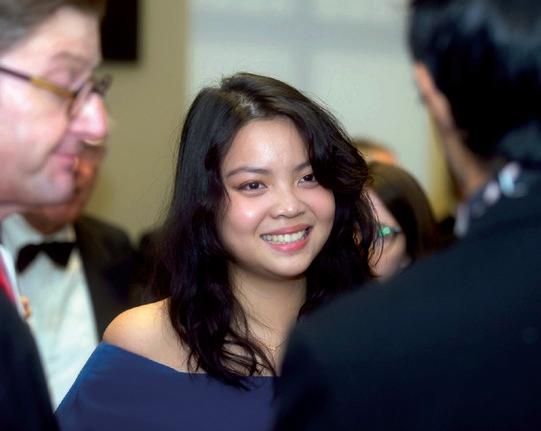
OWWCC is as ever very grateful to Franklin Barrett not just for his role in preparing Vincent Square, but also for the friendly atmosphere and enthusiasm for the game that he brings to it. Finally, OWWCC would like to thank the School and the Elizabethan Club, without whose kind help OWW cricket could not function.
Any OWW wishing to join OWWCC should contact
Jake Robson (Fixtures Secretary): jnarobson@gmail.com 07764181366
Alexander Asher (Treasurer): alexanderasher@gmail.com 07795364694
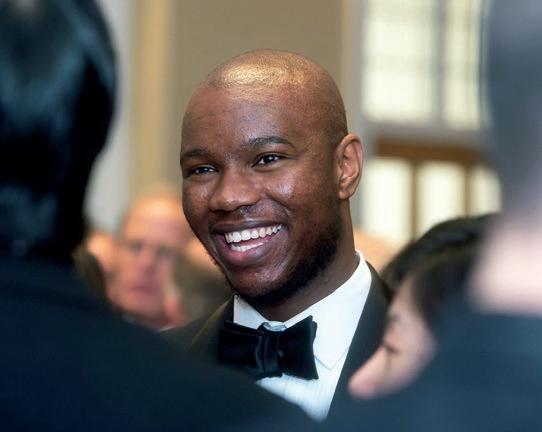
16 The Elizabethan Newsletter 17 ISSUE 2021/22 Events
Elizabethan Club Dinner
Water
Henley Royal Regatta returned in 2021, and the Elizabethan Boat Club was there.
Finn Bannister (BB, 2015-20), Constantine Polychronopolous (WW, 2015-20), James Stevenson (MM, 2015-20) and Pierre Thomas (HH, 2004-09) qualified their coxless four for the Wyfold Challenge Cup, taking one of seven qualifying places from 25 entrants. They drew Curlew RC of south east London for the Wednesday: leading almost from the start with a strong high rating, Elizabethan extended the lead to clear water by the enclosures, putting Curlew under pressure – Curlew struck the booms and Elizabethan won by five lengths. Pierre heroically stepped into the crew at very late notice for qualifiers, in place of James’ brother Angus (HH, 2015-20), so for the four to come together and progress was an impressive performance from all involved. They were unfortunate to draw London Rowing Club ‘A’ for the Thursday.
Come September, an OWW eight made the journey to Eton’s Dorney Lake to attempt to defend our 2019 victory in the Old Blades’ regatta, a sprint regatta for alumni crews.
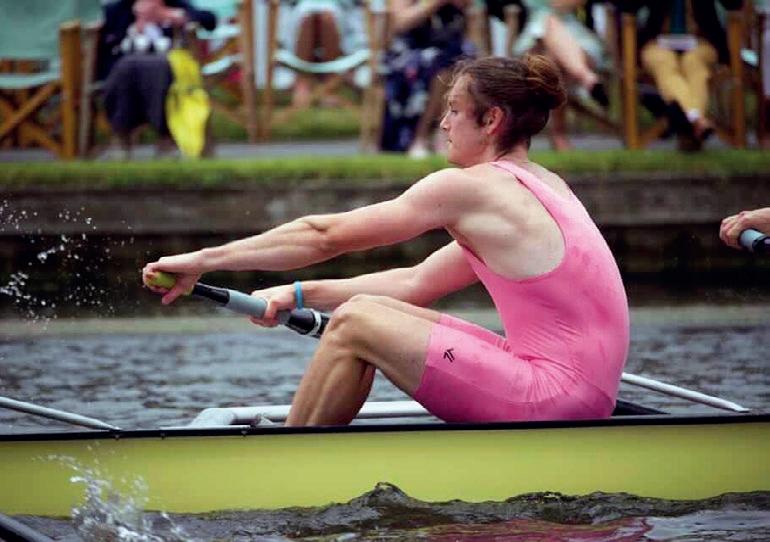


Wilder Fulford (WW 2016-21), Oliver Ellis (LL, 2016-21), Reggie Mitchell (HH, 2012-17), Sam Meijer (HH, 2009-14), Tom Sutton (MM, 2005-2010), Oliver Cox (HH, 1997-2002), Charles Cartisser (AHH, 2016-21) and Oskar Arzt-Jones (LL, 2011-2016) were coxed by Eleanor Shearer (WW, 2012-14). Ellie and this writer were the only veterans of the 2019 race to return: with an expanded field and Eton Vikings fielding three eights in a very determined effort to reclaim the cup, we finished a creditable joint second alongside Shiplake, ahead of St Paul’s. It was brutally quick stuff, all the races were tight and the rates never went below 40, great fun!
The boathouse is now open again, and there will be Henley drinks again this year (along with, we hope, another Elizabethan entry). We also hope to resume our tradition of European racing. EBC exists for the use of all Old Westminsters (male and female, I emphasise) who wish to continue or return to rowing. We welcome both competitive spirits and those who must balance other commitments, and we’re keen to expand the roster again.
If you are interested in getting involved, or in supporting the club, please do get in touch through our Facebook group, the Development Office or one of our members.
Oliver Cox (HH, 1997-2002)
Fives
The 2021-2022 season was one of the Old Westminsters’ greatest to date. A near flawless league season culminated in the club winning the Division 1 league title for the first time in its history.
That was a landmark achievement; and it was a particular joy to have Giles Coren as part of the winning six in our final league match, seeing as he was competing with the OWs in 1986-1987 when the club won Division 2 for the first time and were promoted to Division 1. Concerns held at that time (and on periodic occasions since then) that the club might struggle to hold its own in Division 1 have proved unfounded; and the club has various key people to thank for that (the late Andrew Aitken, John Reynolds, Giles himself, Matthew Wiseman, and of course the current crop of players). That a further appearance in a Barber Cup Semi-Final was regarded as something of a disappointment (following the OWs’ first ever appearance in the final the previous season) is both a marker of where the club stands at the moment and a prime motivator for next year.
From an individual perspective, we have seen a number of fantastic performances. Hugo Young reached his first Major Final at the Northerns (and another Kinnaird Semi-Final) and was a runner-up at the Individuals; Elana Osen reached her third consecutive Ladies’ Nationals Semi-Final before sadly having to withdraw due to a combination of injury and illness; and Can Koksal reached his first Kinnaird Cup Quarter-Final. Harry Dequetteville entered the London Tournament with Can Koksal this season – he has been a key regular player in the national leagues for many years, but this represented his first return to tournament fives in over 20 years, a testament to his hard work in taking his gameplay to a different level.
Finally, and despite his enduring modesty (which has necessitated a different author for this paragraph), this report would not be complete without a mention of Riki Houlden, whose achievements continue to be so extensive that they cannot be done justice by the following potted summary: Winner of the Individuals; two Major titles (and only one defeat at a “Major” all year), winner of nine out of ten Division one matches, Runner-Up for EFA Player of the Year, etc etc. Even that only tells half the story, as Riki’s contribution to the club’s success should be measured just as much by the remarkable effect of his organisation, relentless enthusiasm, coaching and support which has driven many players (including those mentioned above) onto new heights.
Through a culmination of the above results, the club was voted “Team of the Year” at the EFA Awards, which was a true honour. Further to this, we have had a non-OW player request to join the club for the first time since John Reynolds himself over two decades ago and look forward to welcoming him into our ranks in the 2022-23 season.
In short, the club is presently at the highest point in its history; and what is so encouraging is that the team is largely young and full of additional potential to be unlocked. Further, the latest edition of the Westminster-only tournament (named after the late Andrew Aitken) saw four school players attend (and two reach the final alongside Riki and Ed Rose respectively), with others keen but sadly unavailable on the date. The future looks bright indeed.
If you would be interested in playing fives again (competitive or casual!) please get in touch with Riki Houlden at riki.houlden@btinternet.com. We would love to see you join us back on court.
Athletics
Like most sports clubs, Covid continued to play havoc with regular activities and so it was with the athletics section.
The highlight of the season was the triangular match in September between the OWW, The School and the Common Room for the Jim Forrest Serpentine Cup. The 4 kms handicap race, starting near Hyde Park Corner, attracted 25 runners with the OWW having three runners in the top five, led by Will Allen with thirteen minutes and forty four seconds, Miles Copeland on 14.42 and Dominic Williams on 15.03. The handicap event was won by Dyf Coles of the Common Room.
The race is again planned for September this year, probably on a Wednesday early evening. The Inter Old Boys cross country event has traditionally been held for the last 70 years in December and now regularly attracts almost 300 runners. However, the organisers, Thames Hare and Hounds, have decided, after consulting competing clubs, to move the fixture to a Saturday in September, when the five mile course should be drier.
Anyone wanting to take part in these two events, early in the crosscountry season, should contact john@jbgoodbody.co.uk
19 ISSUE 2021/22 18 The Elizabethan Newsletter
Sports Reports
House Reports
Golf
The season got off to a bad start as Covid-19 was still having an effect on sporting events. The Halford Hewitt was moved to September and our first three matches against the Old Uppinghamians, The School and the Old Wykehamists were all cancelled.
In the Halford Hewitt we lost 1 ½ - 3 ½ to Cheltenham. But we had a good run in the Plate competition: we defeated Bundell’s 2-1, then defeated Glenalmond 2-1 before losing ½ - 2 ½ to Epsom who went on to win the Plate.
In the Grafton Morrish we failed to qualify for the Finals.
In the Bernard Darwin we lost 1-2 to Eton in a very close match, Edward Cartwright and Johnny Woolf were playing for the first time. In the Senior Darwin we lost 1-2 to Uppingham.
Teams in the Royal Wimbledon Putting were reduced to three players to make the event smaller, we came first in our qualifying group and so reached the Finals where we came 4th out of eight. Our team was Tom Smith, Henry Kingsbury and Oli Flynn.
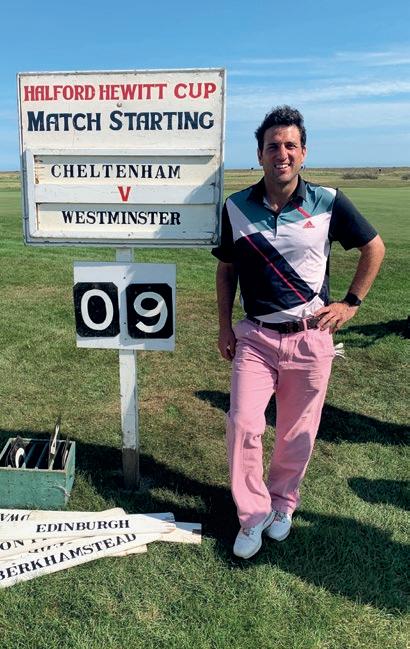
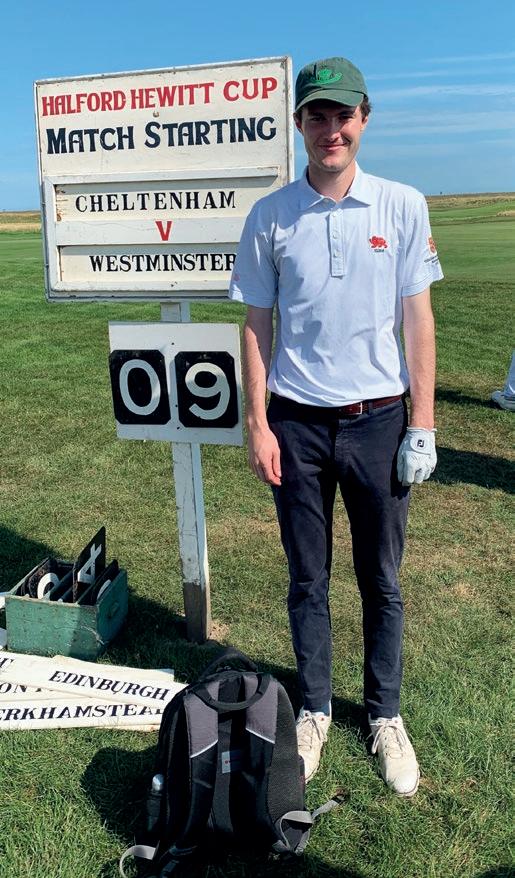
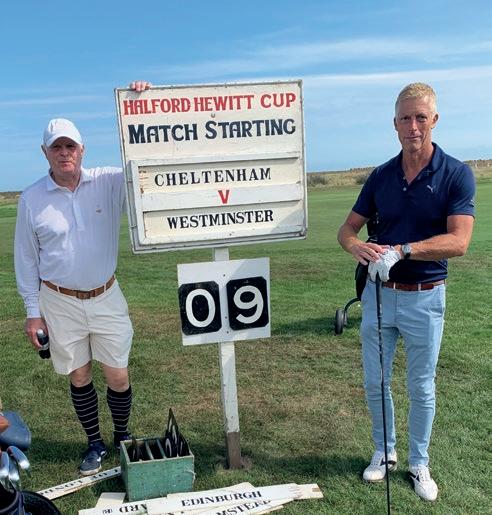
In the Dick Watson Trophy at Aldeburgh we started the weekend badly so it meant on Sunday we had to battle to avoid the Wooden Spoon. At last we played some good golf David Mahoney and Jim won 2 up and Mike Cooper and Henry Kingsbury were 2 down with three to go but managed to win the last three holes to defeat Greshams.
In the matches which were played we defeated the Old Reptonians, halved with the Old Marlburians, lost to the Old Paulines and Old Radleians.
Anybody interested in playing golf with the Old Boy’s Society please contact David Roy. Email address: daroy@btinternet.com
College Society
Reading our previous report for inspiration, it was notable how busy the Society had been in 2019. While we have not been able to organise any events over the past two years – and zoom fatigue persuaded us not to go down that route – the committee have been in contact and hopefully we will be a good position when we are able to meet up again. Luckily, we were able to give two College Society Awards to leaving students, and we look forward to hearing their reports in due course.
Unfortunately, we will not be able to host any events at School until 2023, and while we have already started planning for then, if alumni would be interested in meeting before then elsewhere, do let us know so we can get the ball rolling.
We are also working on a College Newsletter. Some of you have already been in touch with your updates over the past two years, but if anyone else would like to contribute please do email me at collegesocietynewsletter@gmail.com We know that a number of College Alumni have sadly passed due to the pandemic, and would welcome any memories or photos. We hope to have the newsletter published over the summer.
Wishing you all well Arda Eghiayan
Chairman: Oliver Gillie (CC 1955-58) e. oliver.gillie@outlook.com
For membership details
Hon Sec: Arda Eghiayan (CC 2000-2002) e. arda.eghiayan@gmail.com
Dates for your Diary 2022
Thursday 24 November: 7pm
The Elizabethan Club Dinner at School
Friday 2 December: 6.30pm
Elizabethan Club Carols at St Margaret's Church
There will be more events announced in the coming weeks, so please do keep an eye on your inbox.
The Old Grantite Club
The Old Grantite Club is in good heart despite the restrictions imposed on us by the pandemic. We have now held two Annual General Meetings online and the benefits have been significant as it has enabled a much higher attendance and included Grantites living in such far flung places as Toronto and the Democratic Republic of Congo. This increased attendance has in turn led to lively discussions and new ventures such as updating the history of the house.
At the 2021 AGM it was agreed that Messrs Mundy, Hooper and Woods would be encouraged to produce the third volume of the History of Grants and the Old Grantite Club. Volume 1 came out in 1959 thanks to the hard work of Lawrence Tanner and with a foreword by Sir Adrian Boult. In 1986, Messrs Mundy, Hooper, and Woods set about updating the History with David Hornsby, the President of the Old Grantite Club of the day, providing the foreword.
After a gap of thirty five years, it was decided that a long overdue update should be produced, giving a social history of the many changes that had happened concerning in particular the staff, pupils and House. Five Housemasters, eight House Matrons and thirty five Heads of House were asked for their memories of their time Up Grants, together with stories from three families where parents and their offspring were able to compare their stories. Much needed help was also sought from the School Archive Department and the School Development Office, while Dominic Grieve has agreed to write the foreword. Many thanks to everyone who has made this possible.
As the contributions arrived, Simon Mundy, as editor-in-chief, set about stitching them together into a readable history. At the same time, Paul Hooper, the production and publishing guru, started planning the lay-out with photographs from the School archives and the present day. The finished item will shortly be available in book form, combining all three volumes in one, and will be in both hard and soft copy. Thanks to the Old Grantite Club, all production costs will be covered but those wanting a hard copy will be asked to pay for postage and packaging.
Details of how to obtain copies will be made available on both the Old Westminster and OW Connect websites, as well as in other circulars produced by the Development Office. We hope you will enjoy this third edition covering a period of such massive change in society, in particular the mass use of computers and the introduction of girls to what was once a male bastion of academia and fun. Thanks to the Old Grantite Club and the Elizabethan Club.
21 ISSUE 2021/22 20 The Elizabethan Newsletter
Sports Reports
Floreat Caroline Lewis
Interview with Richard Wright
By Jessica Chichester
Chair of the Elizabethan Club, Jessica Chichester, sat down with this year’s Elizabethan Club Speaker, Richard Wright, Former Ambassador and Head of the European Commission’s delegation to Russia to discuss his time at School and his illustrious career.
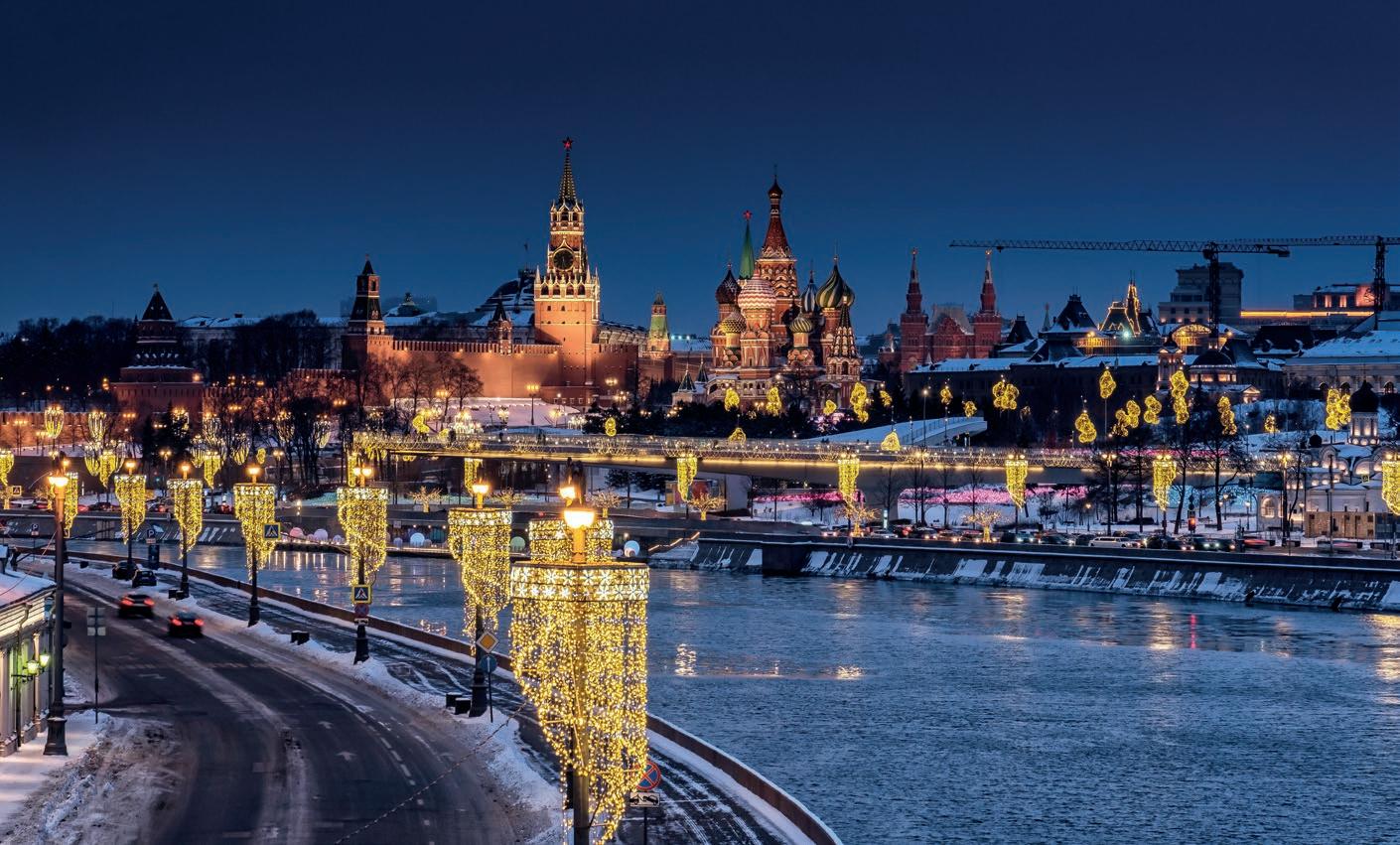
Did you enjoy your time at School?
I absolutely loved it and still have wonderful memories of being there, the environment is marvellous, and I still have great friends from there, including former president Jonathan Carey.
There is no question about the quality of the education and that it sets you up for your future career.
I love the buildings and having the opportunity to read from the lectern at the Abbey was a great thrill. I have only good memories of Westminster; truly enjoyed it from start to finish.
Did you have a favourite teacher i was thinking about this and to be honest, I couldn’t put my finger on a specific teacher. My Housemaster Ian Ross, was supportive and a snuff taker if I remember, which was highly unusual, even in those days! He was a very human person, a good listener and a good Housemaster as was Jumbo Wilson, a sort of tough no-nonsense Scotsman who ran the Fives team, of which I was the captain. remember him giving me a good ticking off when wasn’t working hard enough, and he was right! Those two were influential to me, as well as Mr Boyes a very formidable maths teacher. was naturally orientated to the science side which is not really what I did subsequently but those were the three that came to mind. There were large parts of the school, the arts, and classics, that I didn’t interact with.
Do you enjoy coming back to Elizabethan Club Events?
Having spent most of my career abroad, could not come to many events, but the ones I attended were brilliant. went to the Elizabethan Club Dinner when Lord Malloch Brown went and that was excellent. Jonathan Carey invited me to events, where I have always met people who share the same values and principles, whatever walk of life we come from. I must congratulate the Elizabethan Club who put in a huge amount of effort to keep us in touch with everyone, it's very useful and I try and come to as many events as I can.
Did you see yourself going down a different path whilst you were at Westminster?
Well, at School studied maths, chemistry and physics, and subsequently, I changed to Economics at Cambridge, so I was very much orientated towards the social sciences after that.
If I had my time again I would study, English, history and economics and maybe French as I have worked in a French-speaking environment all my life. But went into directions that thought I was the best at, but I wasn’t particularly good at physics. was good at maths which was useful and very well taught at Westminster. That is of course very relevant for Economics and remained useful throughout my time at Cambridge. However, what
I am interested in now is history, politics and economics, particularly international politics.
Did you envision your career path at Westminster?
Not so much at School, more at Cambridge. I was around in the seventies when there was a big debate about Britain joining the European Community. When we joined on 1 Jan 1973, I became more interested and involved because I was at university. And of course, once Britain joined there was a rush to get British members of staff into positions within the European community and European Commission. That sparked my interest at the time, but after finishing Cambridge, I went to study in the Soviet Union.
That’s how you became interested in Russia?
The course that I loved the most in Cambridge was Economic History of Russia from 1861 to the Present Day (1972) – the whole history of this epic period, from the abolition of the serfs in 1861 to the deposing of the Tsars and the Russian Revolution, it was just fascinating. I loved it, and it was superbly taught by a man called Feinstein who was a reader in economics from South Africa. That’s really what sparked my interest. It was a mix of all those things, learning about that extraordinary time that led to my passion for the subject.
What academic fields qualified you most in your career?
All the above plus my courses in politics and international politics.
Cambridge gave you a challenging intellectual framework that you could apply to problems which remained with me throughout and helped me to delve into things to understand them properly. It gave me that framework to go out into the world and the confidence to become a diplomat.
How did your career as a diplomat start?

Immediately after Cambridge, I worked for 9 months, and then studied at Glasgow University where I jokingly refer to my master’s as a master’s degree in a subject that doesn’t exist – Master of Philosophy of Soviet Studies! People do not study it like that anymore! But I went to the Soviet Union as a student and that was important; it was alien and completely different to what you are used to in the UK – and I had to detach myself from my close family and friends as I was on my own, which was, of course, incredibly difficult. You had to rely on yourself, some people move into full adulthood more easily than others but in my case, that was the way it happened. When I returned home after ten months, I knew intuitively that
the relationship between myself and my parents had changed, and it wasn’t the same anymore and it had evolved – I had moved on. Apart from the fascination of living in the Soviet Union and learning the language, I was living in a very small college in Moscow, and I was the only westerner there and that was incredibly challenging.
After that, I joined the European Commission and my initial job was working in the statistical department in Luxembourg but I switched to the main department in Brussels where we worked on more diplomatic-related questions. I worked on a technical file called export credits which was important at the time because as one of the most interesting negotiations was the financing of the pipelines between the USSR and Europe which is very relevant now in terms of the conflict in Ukraine. Then I did some work in anti-dumping, which was price discrimination across nations and did investigations in Japan and then after that I went to America representing the European Delegation in Washington for four years and that’s when I started becoming very much focused on diplomacy. I worked in the industrial automotive industry for a bit as a department head but that also had an important diplomatic component. ➽
23 ISSUE 2021/22 22 The Elizabethan Newsletter
I went to Russia as Ambassador of the European Commission Mission in the year 2000 for four years, which coincided with the first four years of Putin's presidency. He had just assumed power after Yeltsin had stepped aside and that was fascinating, the most interesting job I ever had in all honesty.

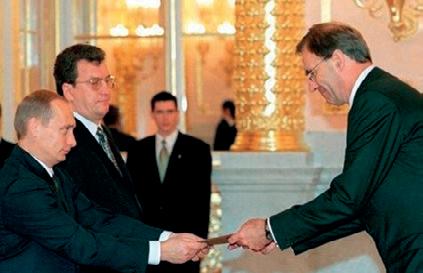
What do you feel was your most valuable contribution to European Russian relations?
Of course, now everything is coloured by the disaster of the war in Ukraine, which deeply upsets me. I love Russian culture, have many Russian friends and spent a lot of my life working and living in Russia so it’s extremely painful for me. I am also very fond of Ukraine, and I am horrified by the things happening to it; this country is leaning West, wants to be part of the European Union and will become a member one day in my view.
So, when I was there, the first few years, I was amongst a group of European ambassadors who thought there was an opportunity to get Russia more closely bound with Europe. Not by joining the EU, although there were countless seminars at the time
about how Russia could join. This was explored in all seriousness, not fancifully, by very smart people.
Recently Tony Blair gave an interview on CNN, saying the same thing. When he first became Prime Minister, the atmosphere at that time was a genuine feeling that Russia could come much closer to Europe. My personal view, which is not shared by a lot of my colleagues, is that there was a chance. If the political commitment could have been made, then we could have found relationships with Russia to bring them closer to Europe.
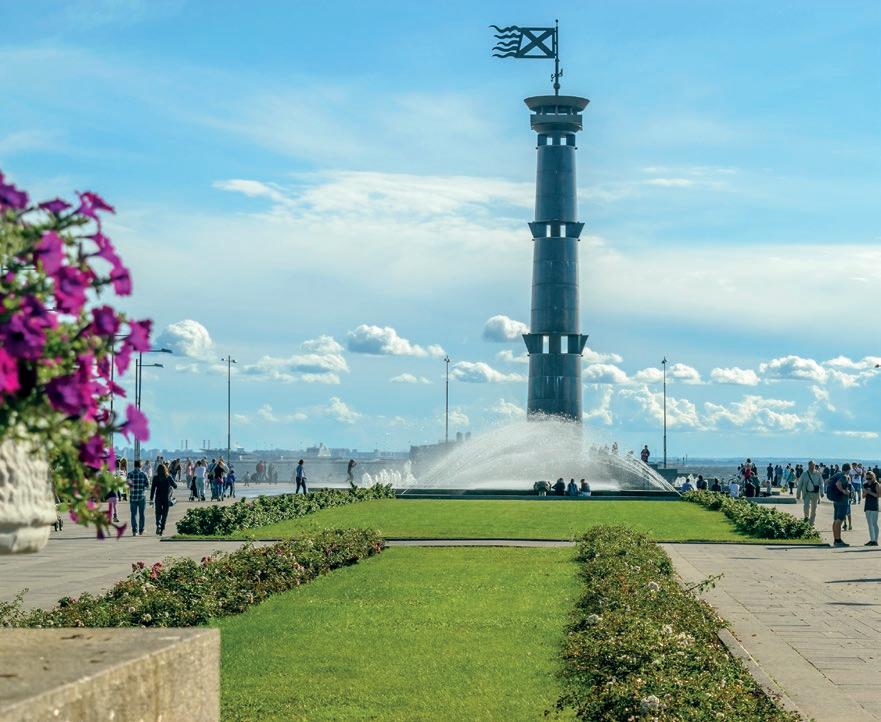
Things started to slide away, and Putin started going after media that was critical of him. By 2004 when I left, it was clear that the initial hopes of drawing Russia closer to Europe had dissipated. Of course, during all this, we had the Iraq War, so these traumatic events coloured my time there. On the other side it should be recalled that after 9/11 Putin was the first leader to call George Bush to offer assistance and allowed the US to use bases in Central Asia to ferry military supplies when they attacked Afghanistan, which people forget, so the atmosphere was better in that respect.
“I remember in 2003 President Putin put on a three-day jamboree for all the heads of states of western governments, to celebrate the 300th anniversary of St Petersburg. The speech was made about the close ties between Europe and Russia and how St Petersburg was “the window on the Western world” which was true.”
The Iraq War was a setback because Russia, France and Germany were opposed, so Europe and the Western community were split. When I was in Moscow, it was an embarrassing situation that those two large countries in Europe were working with Russia to stop the objective of getting international legitimacy of the war, which there never really was.
The opportunity for closer EU-Russia ties was lost. Whether it would have resulted in a stable relationship with Russia is still a question mark and nobody knows, but I certainly feel enough of an effort wasn’t made. If there was something, it would have had to have encompassed trade and energy and foreign policy, but before we got anywhere it all slid away. Now it is chalk and cheese.
To illustrate my point, I remember in 2003 President Putin put on a threeday jamboree for all the heads of states of western governments to celebrate the 300th anniversary of St Petersburg. The speech was made about the close ties between Europe and Russia and how St Petersburg was “the window on the Western world” which was true.
Pavarotti was there, a huge cultural shebang, a magnificent series of events underlined by a good spirit of Russia's closeness to Europe and how the city itself was built by craftsmen from all over Europe. What is happening in Europe now is a total tragedy for everyone and I hope it stops and common sense wins.
Generally, in your career, what are you most proud of?
I'm not someone who thinks in those terms, but was lucky enough to have a very interesting career. Thinking about it, something I am quite proud of is that I was one of the first managers in the European Commission to push forward women in my department as managers. Having seen two of them recently go on to senior positions in the Commission has given me a real thrill to see they have done so well. don’t pretend that I was the only one with influence, far from it, but did try to identify people with real potential who have gone on to be at the top of their fields and that makes me feel great.
I enjoyed building teams and one of the pleasures of working in the EU for 33 years, and subsequently in the UN, was working with people from all nationalities – enjoyed that immensely. Different nationalities think differently, and they approach problems differently, but you have to make things work as each culture brings its unique strength. I didn't particularly care about which nationality people were from in my team, wanted talented people who produced results, and when they worked together it was brilliant. I have more international friends than British – that’s one of the real enjoyments of working in an international environment.
If you were to have your ideal dinner party of five guests, from the past or present, who would they be?
I find it almost impossible to answer this question, having thought about it, especially with only five guests, would need at least fifteen! But I know I would want a balance of men and women and international figures.
I tried to think about what has been important in my life, obviously Russia and Palestine as I worked for the UN Agency for Palestine Refugees for five years which was important to me and of course my career in the US as I spent 10 years there. So, I will try!
1. Serge Diaghilev
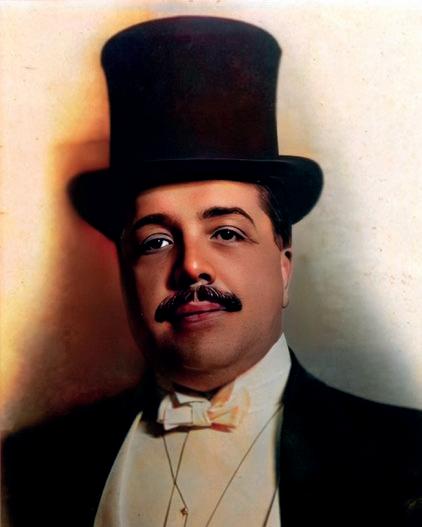
He was a famous entrepreneur who created the Ballet Russes, his troupe came to London a lot and he was the most extraordinary impresario. He successfully integrated the great music of Stravinsky and Prokofiev and choreography with great artists such as Picasso and Matisse all working to produce these famous ballets in Paris and London. He was unique and there hasn’t been anyone like him before or since who has done anything as he did. He ended up in Venice where he died, but he would breeze into towns in the best hotels and order cigars and champagne. He was a notoriously flamboyant gay man whose most famous lover was the dancer and choreographer Nijinsky, an extraordinary figure. I would have him as I can imagine he would be fantastically entertaining!
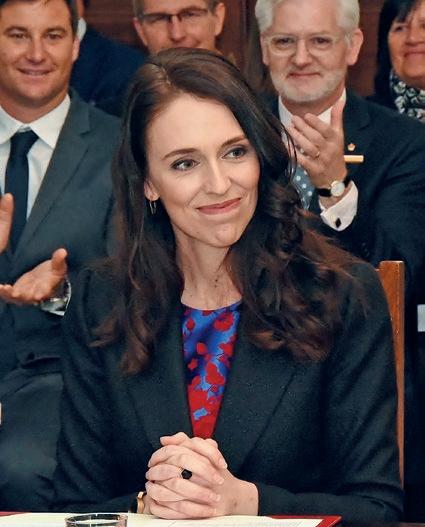
2. Jacinda Ardern
It’s very difficult for me to choose politicians, but one contemporary I would choose is New Zealand Prime Minister, Jacinda Ardern. She seems to me to be a really promising future leader. How she handled the Christchurch massacre showed incredible leadership and common sense. She seems to me someone who is going to have a mega career maybe in the UN later in life. That is someone I would like to represent the younger generation at my dinner party! ➽
25 ISSUE 2021/22 24 The Elizabethan Newsletter
St Petersburg Park, founded in 1995 to commemorate the 300th anniversary of St Petersburg
Serge Diaghilev
Jacinda Ardern
3. Jean Monet
Representing the EU I would have Jean Monet, as he was instrumental in creating the EU. The smartest thing he said was “Europe will develop through crisis” which is exactly what happened in the last few months. Europe has just taken a step forward because of the Ukraine crisis. Lots of new things are being done, including the mutualising of debt, and the funding of arms to Ukraine which has never been done before. Germans have shifted ground in a big way. Europe has become more united and come out of its malaise. He was an incredibly important figure in European history and a great thinker and leader. He would represent France, so we have Russia, France and New Zealand so far.
4. Lyudmila Alexeyeva

Human rights defender in Russia, Lyudmila Alexeyeva, is perhaps not so well known in the West, but she was part of the Moscow Helsinki group which monitored human rights. She was a marvellous person, everyone loved her. She was very, very brave, as were the other people in the Moscow group. I went to an event as an ambassador, to commemorate the 25 years of the CSCE Helsinki Treaty and I remember thinking that these people won in a way because Russia had changed, especially at the time. But they paid a massive price in their personal lives. I knew one dissident whose son had been killed by the KGB. They were in prison and tortured. She was the famous female member of the group who always smiled and showed extraordinary strength through her values, and I was very fond of her.
[Van Gogh]...this artist who died at 37, only sold one painting and has now produced the most popular images of all time. It makes me very emotional. What an extraordinary talent – but socially the dinner party might not be great, he might get terribly drunk!
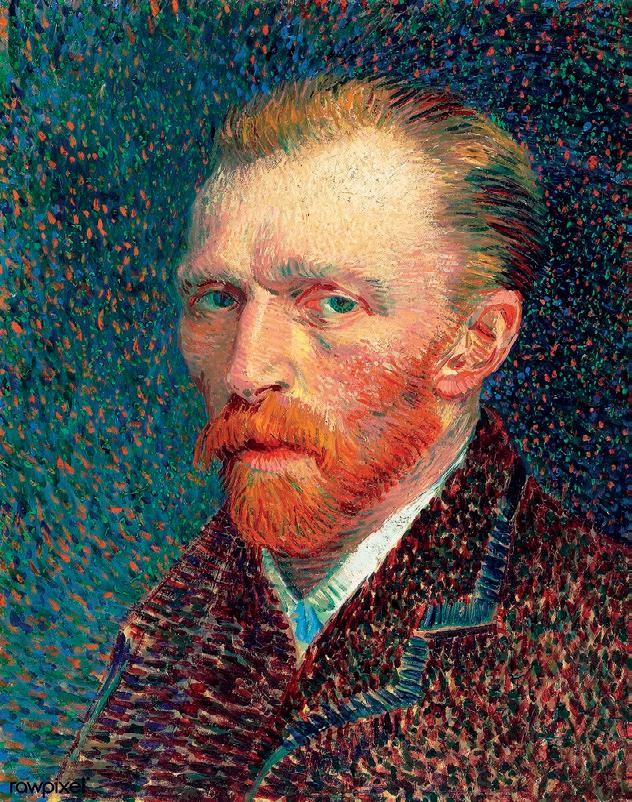
5. Daniel Barenboim
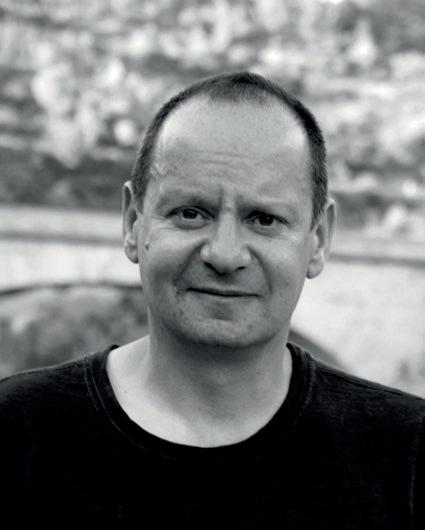
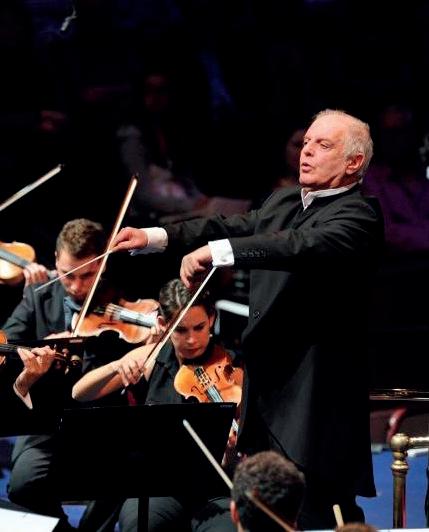
To only have one left is tricky, but it would be. I would be tempted to choose Franklin Roosevelt whom I find to be an amazing political leader, but I am going to pick someone else, Daniel Barenboim the famous pianist. Why I choose him is because not only is he a phenomenal musician and conductor, I remember seeing a concert that he conducted at the Proms in 2012 and it was the most sublime thing I have ever heard, but because he also dedicated a part of his life to developing The West–Eastern Divan Orchestra, which has Palestinians, Israelis, Syrians and musicians from other countries performing and touring together. This is what needs to be done in a region that is so conflicted. He is the instigator, of this amazing thing and I think it is a very admirable thing to do. He was also famously the husband of cellist Jacqueline du Pré so I would choose him as my representative of that region. I admire him greatly!
If I had more, I would choose Phillipe Sands the human rights lawyer in London who wrote East West Street:
On the Origins of Genocide and Crimes against Humanity which is a truly great book that everyone should read.
It’s about the Holocaust and how it affected his family. He is very much involved with setting up a tribunal to try the leaders of Russia for crimes against Ukraine. His family was virtually wiped
out in the Holocaust. He has traced exactly what happened to them.
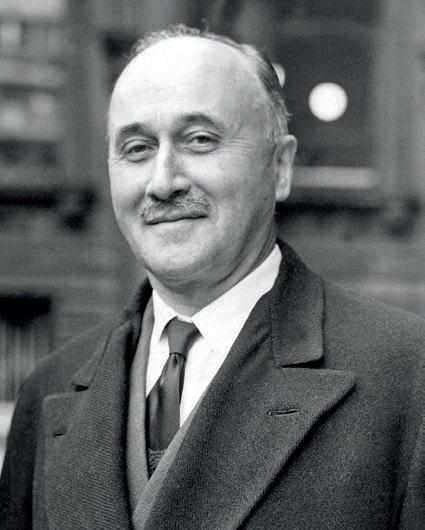
Margaret MacMillan the Canadian historian is marvellous and has a fantastic analysis of conflicts and wars.
Tennessee Williams the playwright as he wrote two of the plays, I love the most, A Streetcar Named Desire and The Glass Menagerie He led a wild and hedonistic life but wrote some of the most stunning plays.
Charles De Gaulle – after reading his biography I suddenly just realised how influential he was in saving France.
Vincent van Gogh for his sublime works. The Van Gogh Museum in Amsterdam published a book of all his letters to his brother explaining the deeply philosophical themes behind his iconic paintings. It gives you a periscope view into the life and creative skills of this wonderful artist who only sold one painting in his lifetime yet has produced some of the most popular artistic images of all time. It makes me very emotional. What an extraordinary talent – but socially the dinner party might not be great, he might get very argumentative!
But my choices are my first five if I can only have the five. An eclectic crew! It certainly would be an interesting night!
What projects are you working on now?
What a great chance to plug my book!
I wrote a book called A Moscow Awakening a novel set in a historical setting, the Soviet Union in the 1970s when was there. I recall instances and life there as a backdrop for a story. I won't give out any secret information, but everyone should immediately go out and buy it!
Many retired diplomats from the EU and British governments take on positions that reflect their careers, but I wanted to do something different and branch out and try my hand at writing.
Of course, I learnt the hard way that there is a huge difference between writing a novel and writing a note to your boss or a commissioner. They are not the same! You must put yourself in a different environment, but I enjoyed doing it immensely.
Now am working on a similar novel but situated in Palestine in the 1930s, a period when the British had a mandate from the League of Nations, which effectively made it a British colony. It was a period of intense
tension because of rapidly increasing Jewish immigration from Europe which coincided with the Nazi period in Germany and a feeling within the Arab community that they were losing their historical land. Particularly in 1936-38 there was a huge Arab uprising against the Brits so it will be set in that period. But will be doing research for now, and one of the wonderful things about living in Britain is the incredible sources of information at your fingertips: the Imperial War Museum, St Anthony College in Oxford, the British Archives, there is just a fantastic amount of resources around. Having identified something that interested me, I could go on forever!
Renovating my house is proving to be more of a battle than I expected! At the moment, my plate is full. am looking forward to speaking at the ECD where I hope to share thoughts about diplomacy and try to make it entertaining and only partly serious!
have had a great time and have been very lucky and wouldn’t change a thing at all! ■
27 ISSUE 2021/22 26 The Elizabethan Newsletter
Jean Monet Lyudmila Alexeyeva
Daniel Barenboim
Phillipe Sands Van Gogh
The Old Westminsters’ Lodge
By Casper Lawson (RR, 1977-80)
Evidence that the freemasons who built the Abbey centuries ago were having some ‘serious fun’. The tradition continues.
Have you ever looked up and wondered about the masons who built Westminster Abbey in the 1200s? They would have lived on-site and been organised in one or more Lodges. Young apprentice masons first roughly cut the basic stone blocks. More experienced craftsmen then smoothed these blocks and finished them exactly to shape. The most skilled, the master masons, designed the structure and trained and developed the other masons.
These skilled master masons would also have hand-carved free stone (hence the word “freemason”), creating the beautiful capitals, gurning gargoyles and other magnificent works of art which we still see today.

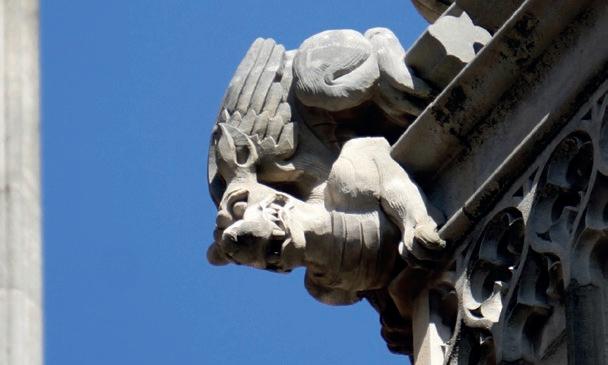


Within four more centuries, these stonemasons Lodges had morphed into freemasons Lodges, accepting as members people unassociated with stone-working but attracted by the fraternal spirit of those Lodges.
Five centuries later still, freemasons continue to meet in fraternal Lodges, across the world, and still progress through the roles of Apprentice, Craftsman and Master Mason.
The Old Westminsters’ Lodge was founded in 1887 and has been meeting more or less continuously ever since, ignoring the odd interruption such as the second world war, which saw the destruction of not only the roof of School but also the original warrant of the Lodge. The Lodge acknowledges this loss at the start of every meeting, when displaying the replacement warrant issued after the 1940s bombing.
Since freemasonry’s development in the politically and religiously turbulent times of the 16th and 17th Centuries, meetings have, unusually inclusively for that era, welcomed those of every religion and every political persuasion.
The aim of the meetings is to keep reinforcing moral messages, to try to make us all the best members of society that we can be, and for each of us to live our lives as the best possible version of ourselves. Regardless of background, we look for what unites us, not what divides us. Charity is important to us. These aims were formulated many centuries ago, but are as relevant today as ever. Women’s Lodges have equivalent aims. The first female freemasons’ Lodges were formed over a century ago, incidentally with a particularly strong representation among suffragettes, who shared freemasonry’s core values.
The Old Westminsters’ Lodge meets four times a year at the School, and then dines convivially in the magnificent College Hall. Members all have a connection with the School, as alumni or otherwise.
The dinner at the end of May is open to all who are interested in knowing more about this fascinating society which has weathered half a millennium of plagues (ancient and recent), civil war, world wars, and sometimes closed-mindedness, yet continues to attract open-minded individuals who want to understand this ancient and unique institution.
To find out how to join in our ‘serious fun’, or just to find out more about this fascinating institution, we invite you to contact us by email on sec@oldwestminsterslodge.org
Visit our website at www.oldwestminsterslodge.org
28 The Elizabethan Newsletter 29 ISSUE 2020/21
BOOKSHELF
Britain’s Informal Empire in Spain, 1830-1950
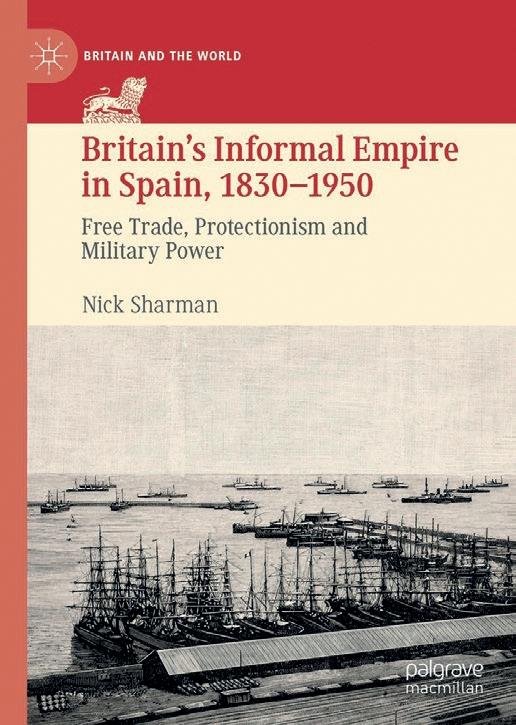
Nick Sharman (AA, 1961-65)
Based on five years of archival research, this book offers a radical reinterpretation of Britain and Spain’s relationship during the growth, apogee and decline of the British Empire. It shows that from the early nineteenth century Britain turned Spain into an ‘informal’ colony, using its economic and military dominance to achieve its strategic and economic ends. Britain’s free trade campaign, which aimed to tear down the legal barriers to its explosive trade and investment expansion, undermined Spain’s attempts to achieve industrial take-off, demonstrating that the relationship between the two countries was imperial in nature, and not simply one of unequal national power.
Exploring five key moments of crisis in their relations, from the First Carlist War in the 1830s to the Second World War, the author analyses Britain’s use of military force in achieving its goals, and the consequences that this had for economic and political policy-making in Spain. Ultimately, the Anglo-Spanish relationship was an early example of the interaction between industrial power and colonies, formal and informal, that characterised the post-World War Two period. An insightful read for anyone researching the British Empire and its colonies, this book offers an innovative perspective by closely examining the volatile relationship between two European powers.
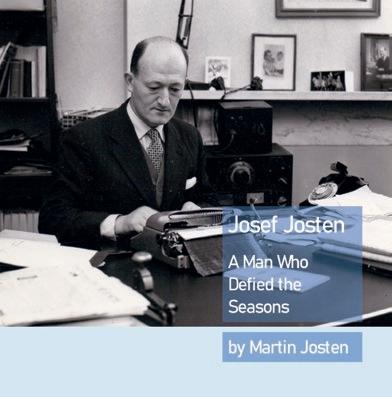
Josef Josten: A Man Who Defied the Seasons
Martin Josten (WW, 1962-67)
Josef Josten experienced a tough childhood, two harrowing escapes, a warrant for his arrest and an assassination attempt. He not only survived, but helped others to survive and was honoured by three nations. Above all, he defied the shifting political seasons and fought tirelessly for the freedom of his country. He had to flee twice from his native Czechoslovakia, once from the Nazi occupation in 1939 (rather topical in the present situation) and again after the Communist coup in 1948. Once in the UK, he set up a press agency to warn of the dangers of authoritarian government. still have a copy of the school pupil magazine, College Street Clarion (issue no. 428, June 1964), with an article he contributed on that subject.
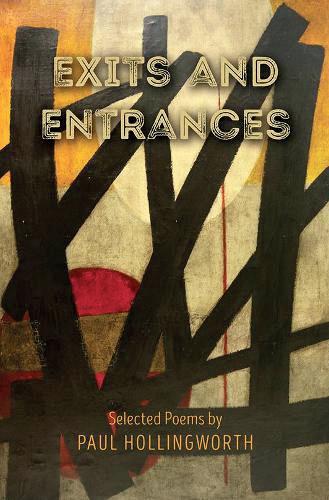
The book is not for sale, Martin is using it to promote donations to a Czech charity which is detailed inside it. Anyone interested in a copy can email me at martin@josten.org.uk
Exits and Entrances: Selected Poems
Paul R. Hollingworth (WW, 1980-84)
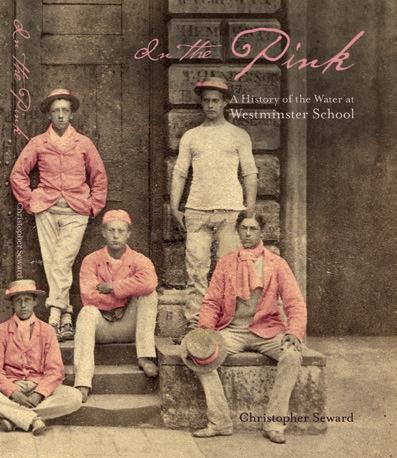
Exits and Entrances is a selection of poems, spanning four decades, by Paul Hollingworth.
Hollingworth incorporates different styles from lyricism, elegy, and rap influences to enhance a resonant statement on varied subjects such as birth and loss, psychosis, redemption, technology, the financial sector, social disorder, and a favourite film or song. Location is important to his work. Hollingworth takes the reader on a journey to the high Andes of Peru and Chile, to Glasgow, to Canvey Estuary, and to a family home in Andalucia.
In the Pink, A History of the Water at Westminster School
Christopher Seward, (RR, 1962-67)
Now available to purchase at the School reception or on-line from https://wsbc-in-the.pink/ This is a new, hardback, complete history of the Boat Club from 1813 to 2019 when the pandemic stopped rowing. Foreword by C.D.Riches.
Once Upon a Myth
Athina Mitropoulos (WW, 2003-05)
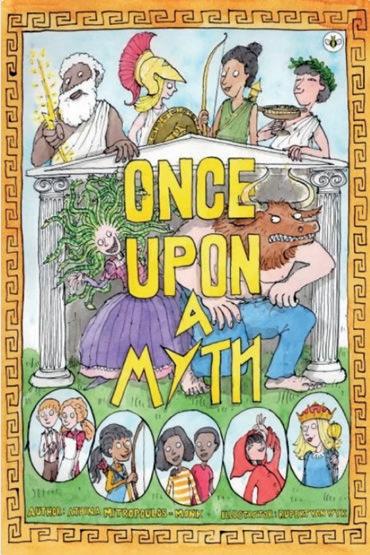
Have you ever wondered what would happen if your favourite characters from fairy tales might stumble into the world of Greek mythology? What if Snow White faced Medusa, Hansel and Gretel took on the Minotaur, and the famous giant beanstalk led up to Olympus, home of the gods?
Once Upon a Myth is a collection of five rhyming stories that bring Fairy Tales and Greek mythology together in a modern and unexpected way.
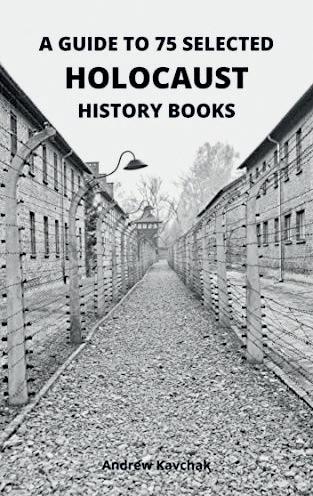
A Guide To 75 Selected Holocaust History Books
Andrew Kavchak (BB, 1976-77)
A Guide to 75 Selected Holocaust History Books is a guide for students (both young and old) interested in learning about the Holocaust. The book begins with the author’s essay about his Holocaust education. The subsequent chapters provide an overview of the history of the Holocaust followed by a discussion of 75 selected books and their authors that shed some light on Holocaust history and key subjects including Kristallnacht, the Wannsee Conference, the ghettos, the Einsatzgruppen death squads, the death camps and revolts. Also included are several chapters about what the Allies knew about the genocide as it unfolded and their response. The final chapters are about those who tried to provide help and assistance to desperate Jews.
31 ISSUE 2021/22 30 The Elizabethan Newsletter
Alumni in Print
Elizabeth Wells Archivist and Records Manager
The Pancake Greaze
The earliest recorded reference to the ‘Westminster Greaze’, is in the autobiography of Jeremy Bentham (OW 1755-1760).
In the time since, our annual Shrove Tuesday celebration has changed and evolved, yet remains an extraordinary event in the School's calendar.
ohn Sargeaunt, whose history of the school was published in 1898, suggested that the Greaze was likely to be a medieval tradition.
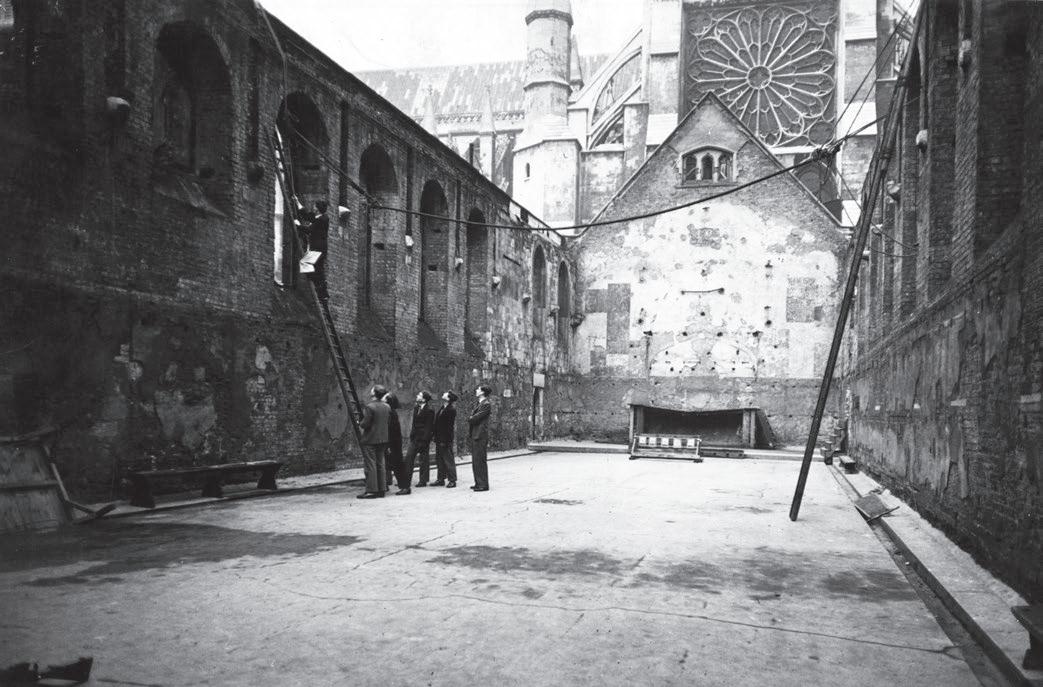
The cooking of pancakes to use up eggs, fat and dairy alongside chaotic festivities of misrule, were a common part of Catholic practice in medieval England – the Mardi Gras (literally ‘Fat Tuesday’) prior to a period of Lenten fasting and abstemiousness. Some similar Shrovetide rituals survive across the country, including football games such as that played annual at Ashbourne, Derbyshire, which had its origins in the 12th century. However, the core component of the Westminster tradition, as indicated in Bentham’s account, is the Greaze bar up School. This would suggest that the Greaze’s familiar form did not appear until the 1599 at the earliest, the year in which Westminster took over the space which had formerly been the Monks’ Dormitory as its school room.
The origins of the Greaze bar remain mysterious. It has been described as the world’s longest piece of pig iron, and in the absence of a competing claim, we should perhaps assert this record. Its primary use by the school was as a curtain pole, which separated the older pupils, taught in the north end of School, from the younger pupils, or ‘Under School’ taught at the south.
On the day of the Greaze this curtain was drawn back, which adds to the sense of the event as a type of Saturnalia in which the normal rhythm and hierarchy of school life was suspended. Until the resumption of the Greaze following the Second World War, the pancake was thrown from the north end of school to the south, a direction which was reversed, possibly as there is more room for spectators at the north end of the room.
Another significant change in the tradition is highlighted in Captain Markham’s (OW 1849-1855) recollection of the event:
‘During my stay at Westminster, six and a quarter years, the whole pancake was only once secured and the sovereign claimed.’
Whilst now the school has weighing scales on hand and the boy with the biggest piece of the pancake receives a prize, previously only those who
caught the pancake entire were declared winners. There was one exception in 1880, recorded in the Town Boy Ledger: ‘The pancake was duly launched over the bar, & was caught by O. Scoones (Q.S.), at the end of the Greeze Scoones still remained in possession of half the pancake. & W. Bury the other half, which however he gave up. The Dean presented Scoones with the guinea, altho: strictly speaking, the pancake shd be presented whole.’
Scoones is one of the few people to have won the Greaze twice, when he took the prize again in 1883, so perhaps Bury should not have been so generous!
The following year, William Rutherford, recently appointed Head Master, attempted to reform the tradition. ‘After his first attendance at the curious old ceremony, in which the whole school had always taken part, he expressed the opinion to the Sixth Form that it was an ‘ungentlemanly performance’ and requested that they would not take part in it. Next Shrove Tuesday the edict went forth that instead of the whole school one representative only from each form should be permitted to try for the pancake.’

Rutherford’s instincts were doubtless correct, but his method of enacting change was high-handed and
confrontational. Pupils, feeling unsatisfied by the reforms, staged a protest: ‘some forty boys under the leadership of H P Lowe, QS Monitor, who donned the Cook’s clothes, organized a supplementary Greaze of a more exciting nature. In the middle of the fun Rutherford reappeared on the scene and the impromptu Greaze came to an abrupt end. The culprits’ names were taken and the Head Master departed, majestic in his wrath, leaving them breathing fire and slaughter against him. They could not perceive that the old order had passed.’
The Cook
The Cook has a critical role to play in both preparing the pancake and then successfully tossing it over the Greaze bar. Today, the pancake’s ingredients are the same as those eaten in the school dining hall, although those not destined for human consumption are made thicker so to withstand the forces inflicted on them by the competition. The notion that horsehair was once mixed into the batter to create a stronger consistency derives from Markham’s account, but is unsubstantiated.
In the past, the number of attempts given to the cook to throw the pancake over the bar was limited to two or three. If the cook failed, the Greaze did not take place. This could happen for several years running, much to the disappointment of the pupils. In order to motivate the cook, and to provide the pupils with an alternative entertainment in the event of failure, pupils were permitted to ‘book’ the cook – throw their Latin primers at him – after a third unsuccessful toss.
In 1865 an incident now infamous in Greaze history took place. A pupil named Morgan, aware that ‘the new cook of the Queen’s Scholars was a duffer at the pancake job,’ took an enormous Liddell & Scott Greek Lexicon with him and threw it at the cook following his anticipated failure. ➽
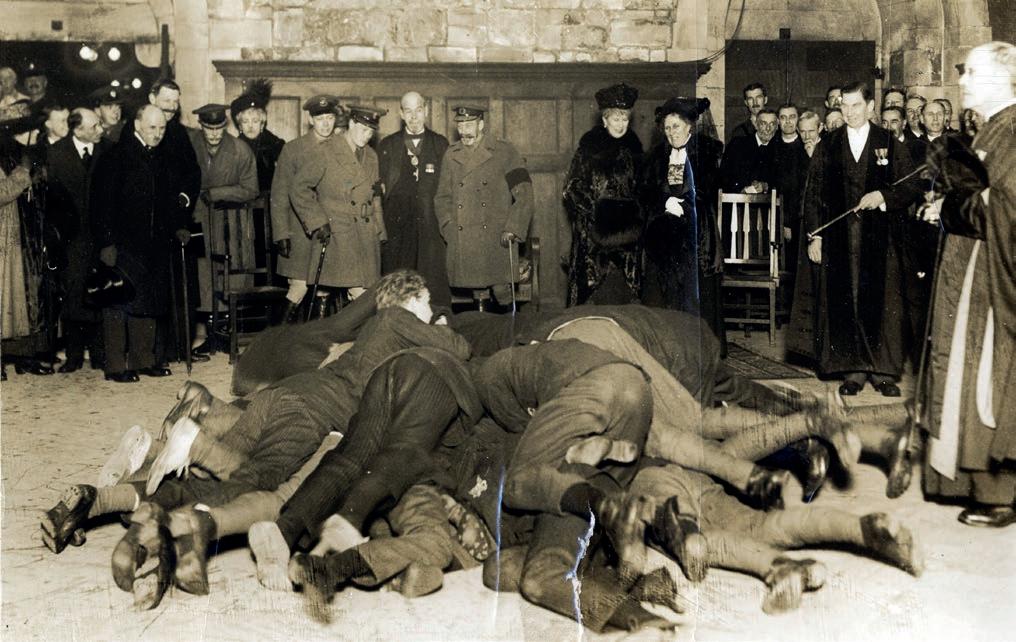
33 ISSUE 2021/22 32 The Elizabethan Newsletter
Archives
From the
1946 Getting ready for the Greaze
1919 Greaze
The Higher School was divided from the lower by a bar, and it was one of our pastimes to get the Cook to throw a pancake over it.
1929-34 Scramble R J Arnold
The cook retaliated and threw his frying pan at a group of boys, catching one over the head, and fleeing the scene. He was dismissed, and Dr Scott, the Head Master, wrote a long Greek poem to commemorate the event in Homeric style, which has recently been translated by Archive volunteer, Charles Low (QS 1967-1972).
After the War
There were attempts to continue the tradition of the Greaze whilst the school was evacuated during the Second World War. The King’s Scholars and Rigaud’s were based together in Whitbourne and on Shrove Tuesday a small group of pupils: ‘greazed on the lawn of Whitbourne Court after College John had tossed a pancake from a balcony. The contest was always fierce and the winner was rewarded well, but not, of course, with the guinea. The grass was probably more comfortable than the floor-boards up School, but it was not the real thing.’
School was hit by an incendiary bomb in 1941 and left as a shell for the remainder of the war. The first priority of pupils when they returned to Westminster was to re-erect the Greaze bar which had miraculously survived
the blast intact, although somewhat bent out of shape.
The 1946 Greaze took place under open skies with snow on the ground. However, by 1948 focus was placed on comfort. The Elizabethan noted that ‘for the first time chairs were provided for visitors, School was re-roofed and heated, and there was no danger, as last year, that the weather might interfere with the ceremony.’
In the latter half of the 20th century it became customary to wear fancy dress when taking part in the Greaze, although in the 21st century this tradition made way for the more practical house t-shirts. In the early 80s a group of pupils with great daring and very expertly removed and hid the Greaze bar in the Fives Courts as a protest about the exclusion of a friend.
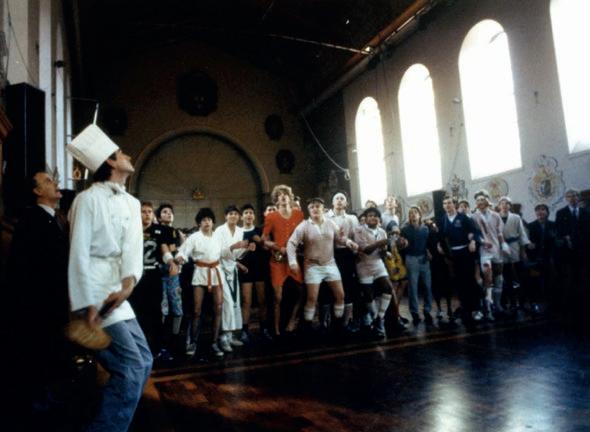
Dire threats ensured that it was returned the day before the Greaze was held – what would the rest of the School have had to say there had been no occasion for the Dean to beg the Play as he has traditionally done. The bar is now padlocked in place. Despite the Under Master in the late 90s referring the risk to the Healthy and Safety Committee, this exceptionally daft ceremony continued until the outbreak of Covid-19, though
diminished further with no Fifth Form and Lower Shell participants and now carried out bare foot on safer matting than the mahogany flooring could offer.
The World’s Oldest Pancake?
Bethany

Duck, Archives Assistant
The 1922 Greaze was held later in the day than normal, owing to the wedding of Princess Mary and Henry Lascelles, but took place as usual up School once the Dean of Westminster had married the happy couple. Its winner, Raymond Otto Seaton Milde, was not the most willing of Greaze participants, as his classmate Stephen Ensor (HBB 1921-24) recalls in a letter sent into The Elizabethan in 1983: When he was chosen as our representative he was very reluctant to compete, but he did not let us down and I remember him holding up a crumpled pancake whole and entire. We were amazed by his success and astounded that it did not disintegrate.
Proud of his win, Milde kept the pancake and eventually framed it in a small wooden box with a glass top. Other than his victory in the Greaze, the record of his short time at Westminster is sparse. He does appear in the June 1922 edition of The Elizabethan for his successes in the Athletics that year. Perhaps his experience leaping for the pancake made good practise for the hurdles and high jump:
telegram from the King any day now.
Although Milde was arguably the most successful in preserving the Greaze pancake after his triumph, he was certainly not the only one who tried. After observing Milde’s win the year prior, Stephen Ensor recounts his own performance in a slightly unconventional Greaze in 1923:
The following year all forms were told to remain in their classrooms until sent for. Two forms were never summoned, including my Classical Remove. For once protests were effective and four from each of the two forms were chosen for a Pancake Greaze on the next day, the only time one had taken place on Ash Wednesday. Costley-White, the Head Master and Tyson, the Bursar, generously gave ten shillings each towards the prize, which I happened to win for getting the largest piece of pancake. I kept it for a year until it went mouldy.
George Leonard Brown, victor of the 1910 Greaze, had a little more success in preserving his winnings. His tactic on Shrove Tuesday was ‘lay flat upon the pancake’, as reported in the Daily
Telegraph, and he succeeded in holding on to most, although not all, of it. After his win, he kept the pancake in a neatly labelled box and it survived until at least 1981, when Brown’s daughter reported a large amount of family pride in the relic in a letter to then Head Master John Rae. If this pancake still exists, it would almost certainly be the oldest surviving Greaze pancake, at 122 years, but pieces were on occasion fed to the family’s dogs so it might have all been eaten. Fossilised Greaze pancakes are supposedly well-received dog treats, but we can’t recommend testing the matter with your own pets, should you happen to have an ancient pancake to hand. ■
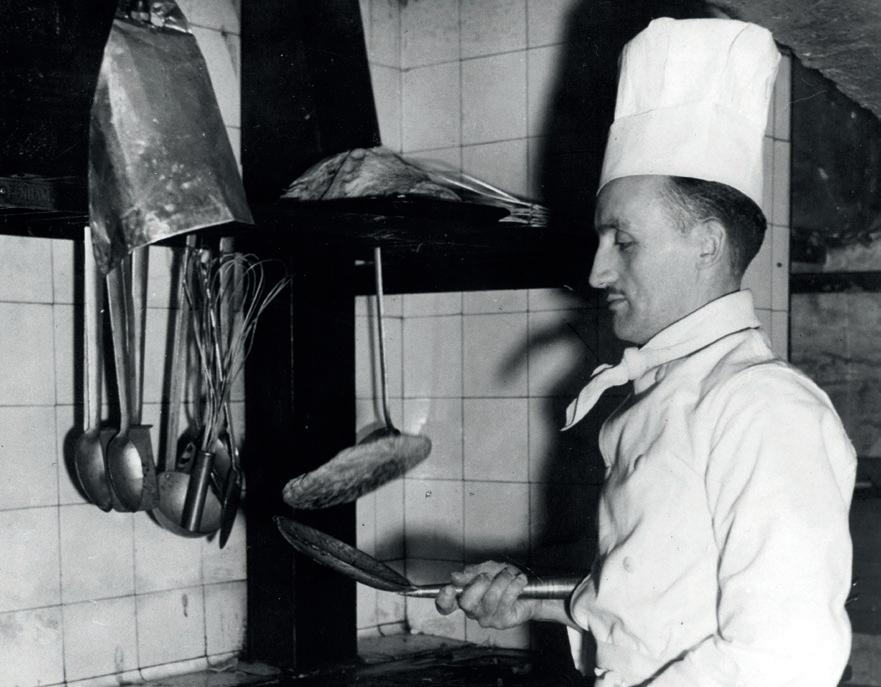
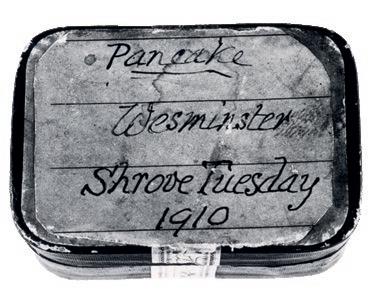
Can you help?
We would like to compile a complete list of Greaze winners. Sadly, for many years these were not properly recorded. Large gaps in our records exist from the 1970s onwards. If you won the Greaze, or remember who did during your time at the school, please do get in touch by emailing archives@westminster.org.uk
Thanks
The spoils of many a Covid clear-out continue to make their way to the archive, for which we are very grateful. Thank you also to those who have donated their time and money towards conservation work. We love adding new items to our collections, which are widely used both within and outside of the school. Please keep the donations coming!
Milde distinguished himself by winning the hundred, quarter, hurdles and high jump. His high jump of 4ft. 10 ins. is a very good jump for the under fifteen class, and has only been beaten once before, namely by a jump of 4ft. 11 ins. in 1889, while it has been equalled twice, in 1914 and 1917.
Milde left the school in December 1922 after only attending for just over one year. He spent fifty years as a tea merchant, served in the Royal Air Force Volunteer Reserve in the Second World War, and died in 1989. After his death, his family were not particularly endeared to or inclined to keep the now almost seventy-year-old pancake. It eventually made its way to the school archives, where it still intrigues and horrifies pupils. The pancake has an annual outing in the Greaze display in the library and is this year accompanied by some birthday bunting in celebration of its centenary year. We’re expecting a
35 ISSUE 2021/22 34 The Elizabethan Newsletter From the Archives
Chef Mr Sellars prepares pancake one
1989 Greaze
Greaze pancake
In Memoriam
The Development Office have been made aware of the deaths of the following members of the Elizabethan Club and greater Westminster School community, since the publication of the last Elizabethan Newsletter.
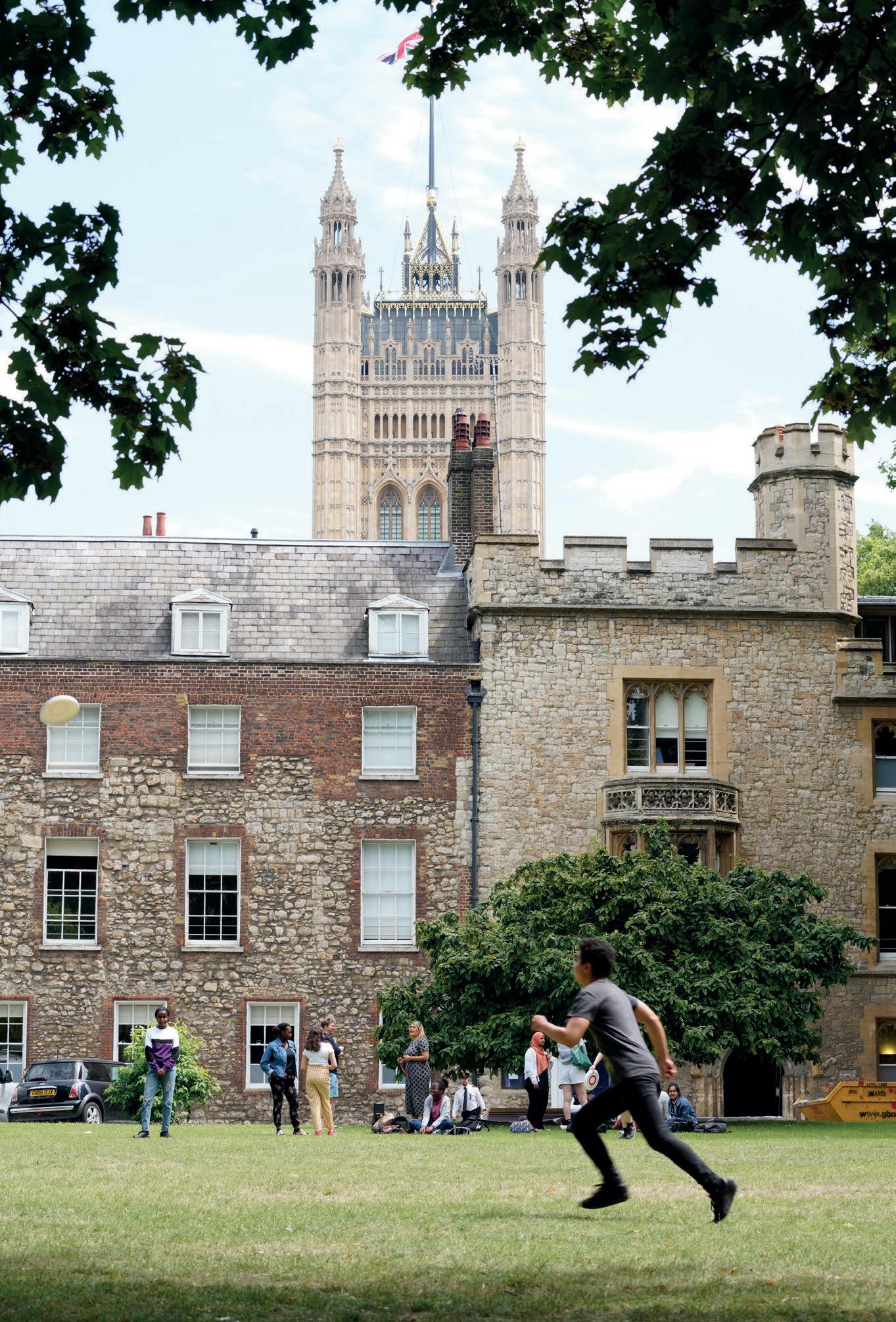
Benjamin David Sidley Ashton (LL, 1995-97)
Michael David Vaughan Davies (AA, 1957-63)
Roderick Malcolm Glennie (LL, 1960-64)
Julian Goronwy Hurstfield (LL, 1962-66)
Alastair Lack (LL, 1956-60)
Alastair Murray Lloyd (LL, 1962-67)
Christopher David Lloyd (LL, 1956-60)
Andrew Thomas Lloyd James (RR, 1957-62)
David Mathias Lloyd-Jones (GG, 1948-53)
Harvey Bosco Parker (DD, 2014-19)
Alexander Peckham (AA, 1975-80)
Anthony Plummer (BB, 1946-51)
Michael Ian Ross
David Ellison Scrase (BB, 1963-67)
John Harvey Noake Thomas (AA, 1952-56)
Crispin Charles Cervantes Tickell (CC, 1944-49)
John Neshan Hanson Tiratsoo (AA, 1961-67)
David John Macleod Wilson (LL, 1959-63)
Tributes
JULIAN GORONWY HURSTFIELD (LL, 1962-66)
d. 6th May 2021
George Conyne, former Lecturer in the School of History, reflects on his friend and former colleague:
My first academic meeting at the University of Kent considered the academic progress of certain first year History students. My colleague Julian Hurstfield, who died on 6 May 2020 and taught American History and American Studies, 1976 to 1996, was in the chair. After many candidates, we considered one whose early work was generally marked at the “pass” whilst his later work was marked as consistently at the “merit” level. I suggested that the student was on the borderline but the recent work was all of the higher standard, we ought to award him a “merit” overall. There was no voiced opposition to this. Three candidates later, a candidate appeared with the exact same set of marks; Julian said, “George, do you want to do your Henry Fonda impersonation again?”
I could not repress a laugh because he referred to Fonda’s role in the 1957 classic, 12 Angry Men in which he is the only juror who isn’t ready to convict a defendant. In doing so, he demonstrated that we thought alike and started a friendship of thirty years. It was typical of a scholar who was closer to me in terms of what we studied and who had gone out of his way to be kind and supportive to the newest arrival in the Board of Studies.
History was a “natural” subject to study for someone whose father was the Astor Professor in the University of London. That interest continued through his undergraduate training at Oxford and the writing of his Ph.D. under the direction of Herbert Nicholas. It was published as America and the French Nation, 1939-1945 (Chapel Hill, 1986) and is still a leading study of the difficulties Franklin Roosevelt had with de Gaulle and the other leading French politicians and generals. Whilst this subject always remained important to him, his interests ranged far and wide. He embraced the addition of America Studies to the Kent curriculum, which included two popular courses he designed: America through Autobiography which introduced students to that complex form and The Adamses and the James, which looked in detail at the contributions to politics, government, diplomacy, scholarship, fiction and thought of those families over the generations. Not only were the courses blessed with a high quality of content, he taught them with a warmth, an
37 ISSUE 2020/21 36 The Elizabethan Newsletter
eagerness to encourage and wit that brought out the best in students.
Dr Aurélie Basha i Novosejt reflects on Julian’s work on Franco-American relations:
Dr Hurstfield was a respected historian of Franco-American relations. In his book America and the French Nation he went beyond traditional diplomatic history to consider how American public opinion responded to France and the French people during the Second World War. His writing was engaging and, with the use of colourful anecdotes, he brought to life important and enduring questions about FrancoAmerican relations.
contributing to the Fitzwilliam’s reputation among charitable bodies, dealers and auction rooms as the most acquisitive museum in the country. His wide knowledge of the art market and detective-like skills in locating works of art in private hands made him an invaluable asset as an advisor on external bodies, notably the Acceptance-in-Lieu panel on which he served from 2005 to 2015.
DAVID ELLISON SCRASE (BB 1963-67)
15 March 1949 – 31 October 2020
It is with enormous sadness that we share news of the death of David Scrase, Honorary Keeper of Italian Drawings, Honorary Marlay Group member, former Assistant Keeper, then Keeper, of Paintings, Drawings and Prints and Assistant Director (Collections).
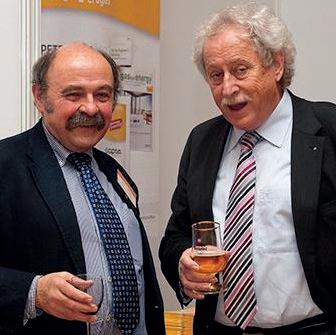
David joined the Fitzwilliam as Assistant Keeper of Paintings and Drawings in 1976, becoming Keeper of a merged department of Paintings, Drawings and Prints in 1985; he served as Assistant Director of Collections from 2003 until his retirement in 2013.
In that period, David developed a knowledge of the collections across the curatorial departments that was unsurpassed. His tours of the museum and cultural sites visited abroad with the Friends and Marlay Group – more virtuoso performance than lecture and delivered with as much panache to students as to visiting dignitaries –became legendary, and invariably left their mark on his bedazzled audience.
Although acutely conscious that museums were repositories of historic collections that must be researched, published and cared for, David also recognized that they needed to grow, to remain alive and relevant. Under his leadership acquisitions were a priority,
Though he took great (and frequently provocative) pride in claiming he was no art historian, his knowledge of the history and making of art was both profound and wide-ranging, and his visual memory truly astonishing. But his real passion was for Italian art, and particularly drawings – a field in which he earned international acclaim for his expertise. In 2011 he triumphantly achieved his career-long ambition to publish the Fitzwilliam’s collection of Italian drawings from the 14th to the 20th century – the first, and to-date only, systematic catalogue of its kind.
For all his glittering professional achievements, colleagues will remember David most for his charm, generosity and mischievous sense of fun. His effervescence was infectious, even if his teasing repartee could be unsettling to the uninitiated, leaving them with an intoxicating feeling of having been simultaneously tickled by bubbles, and prickled with barbs.
Giving in spirit, David was also extraordinarily generous in material terms. Individuals were at any time liable to be presented with an impromptu gift (fresh fish hand-delivered from a Cambridge market stall and left on the office chair was a favourite), but he also made numerous thoughtful donations to the Fitzwilliam and other museums, invariably offered as a token of his esteem for, or in memory of, a colleague or friend.
The Fitzwilliam has lost one of the most remarkable, inspirational and long-serving members of its community. He will be sorely missed, but lives on in our memories, and in our hearts.
JOHN NESHAN HANSON TIRATSOO (AA 1961-67)
d. November 2019
John Tiratsoo was editor of the Pipelines International Digest. Before starting Pipelines International Digest, John was the editor GPM and of the independent UK-based magazine Pipeline World, the successor to Pipes & Pipelines International, for over 20 years. Prior to this, he achieved chartered (professional) status as a civil engineer and spent his early career building roads and bridges in the UK for the Department of Transport. He then moved to join Sir Alexander Gibb and Partners in East Africa, where he spend a year in Tanzania building roads, two years based in Nairobi on a variety of projects, and two years in the bush in Malawi as an engineer on a major water-treatment and pipeline project for Blantyre.
Having returned to the UK and unpacked, he joined Scientific Surveys Ltd, publisher of Pipes & Pipelines International, in 1979. Since then he has become an active member of the Pipeline Industries Guild, sitting on its committees, its Council, and now its Board (as an ex-officio member).
Part of his work with the Guild involves editing and publishing its journal, and the annual Pipeline Industry Directory, its directory of members.
John has initiated a number of successful conference series, dealing with pipeline pigging, pipeline integrity, and with pipeline risk management and reliability. These events are now held in Houston, Amsterdam, and elsewhere, and are combined with successful series of industry-based training courses. The series of conferences on pipeline pigging has resulted in three editions of the book Pipeline Pigging Technology, which John has also edited and published. As an independent magazine, Pipeline World is regularly read by over 5000 readers world-wide, including members of the US-based Pipeline Research Council International (PRCI) and the predominantly UK-based members of the Pipeline Industries Guild. The magazine covers pipes of all types, from around 6in diameter upwards, and John tries to feature news equally from the oil, gas, water, sewerage, on–-and offshore industries. It is, of course, not always possible to be completely even-handed editorially in any particular issue, but over a year it is hoped that the balance is maintained.
38 The Elizabethan Newsletter 39 ISSUE 2020/21
John Tiratsoo (left)
ALEXANDER PECKHAM (AA 1975-80)
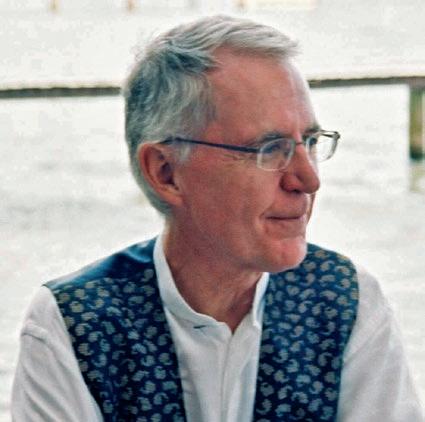
My brother, the environmentalist Alexander Peckham, who has died aged 59, co-founded the Centre for Environment and Business in Scotland in 1989 and then went on to establish New Zealand’s largest cider orchard and leading independent cidery.
Alex was born in Cambridge, to Catherine (nee King), a paediatric epidemiologist, and Michael Peckham, an artist and oncologist. When our family moved to Paris with my father’s work, Alex was sent to the local school, an immersion that led to a fluency in French and to a lifelong passion for French culture. Back in London, he attended the French Lycée and Westminster school. At over 6 ft 3 in, he was a star oarsman and became head of Westminster’s rowing club. He then studied geology at the University of Edinburgh, and went on to obtain an MSC in hydrogeology at the University of Birmingham.
Alex’s maternal grandfather, the scientist and environmentalist Alexander King, was an important influence on his life. In 1968, King had co-founded the environmental think-tank the Club of Rome, which commissioned the bestselling report Limits to Growth from a team of researchers at MIT. Encouraged by his grandfather, and in partnership with his wife, Anne-Caroline (née Filer), whom he had married in 1987, Alex set up the Centre for Environment and Business in Edinburgh, an organisation that would help businesses understand and fulfil their obligations under the new Environmental Protection Act of 1990.

In 1992, this evolved into the Institute of Environmental Management, which worked closely with UK government to establish professional NVQ standards for environmental management. Some years later, the institute merged with the Institute of Environmental Assessment to create a new professional body that continues to thrive. An early advocate of sustainability, Alex authored several
educational books on environmental issues, including Global Warming (1991).
In 1999, Alex and Caroline moved to Fiunary on the Morvern peninsula and built a prototype passive house on the grounds of an estate overlooking the Sound of Mull, where they home schooled their three children.
Four years later, the family moved to New Zealand and went on to found Peckham’s Cidery and Orchard in Upper Moutere, close to Nelson at the top of the South Island, where they fused their environmental concerns and technical expertise with a passion for the outdoors.
In contrast to the ciders produced by large-scale industrial cideries, which use unripe, rejected fruit, or concentrate, Peckham’s uses pure juice from quality heritage fruit, which took months to track down through word of mouth and old maps of abandoned orchards.
Production is overseen on the estate, from milling and pressing to fermenting and bottling. Their award-winning cider has done much to promote New Zealand’s reputation as a region of world-class craft ciders to rival its better-known wines.
Alex was a person of immense charisma and vision who shied away from the glare of publicity, preferring the solitude of the open sea and mountains, or working on the orchard. A keen sailor, he was about to embark on a sailing expedition when he collapsed and was diagnosed with a malignant brain tumour.
He is survived by Caroline and their children, Lydia, Oliver and Scarlett, and by his mother, Catherine, and two siblings, Daniel and me. Originally printed in the Guardian
ANDREW (‘ANDY’) THOMAS LLOYD JAMES (RR 1957-1962)
d. 28 January 2022
As an inspiring and visionary leader at both the ABC and SBS, Andy Lloyd James made an immense and enduring contribution to public broadcasting in Australia. He believed that public broadcasting had the power to broaden minds, to refine tastes, to challenge attitudes and enrich lives.
Andy Lloyd James was born in Hampstead, London in 1944, just weeks before the last heavy German air raids on London. He would walk to his primary school, past the home of his late grandparents, Arthur Lloyd James and Elsie Owen the violinist.
This was a public broadcasting dynasty. His grandfather oversaw the writing of the original English pronunciation dictionary for the BBC. Time Magazine described him as one of the greatest living authorities on the English language and its pronunciation. His father David was a BBC broadcaster, who, among other things, read poetry on air. He famously declared that “no son of mine will be in broadcasting, it’s too insecure”. His mother Penelope, who drove an ambulance during the war, ran the household, raising him, older brother Will and younger sister Sarah. Their mother was a prodigious reader and always had a large book on the go on the kitchen table, along with a cigarette and a generous sized glass of Spanish red.
But black clouds had descended over their home life. The year before Lloyd James was born his grandfather Arthur killed his wife while suffering a depressive psychosis brought on by the war. He subsequently committed suicide while being treated at Broadmoor psychiatric asylum. His father also had bouts of depression, which led to a sometimes-fraught relationship. Aged 14, Lloyd James was sent to board at Westminster School in London, which proved a welcome escape.
Lloyd James went straight from school to become an articled clerk in
a Brighton law firm. It was not his calling. He left after three years. An ex-girlfriend had gone to Australia, his current girlfriend was about to return there. He took a series of menial jobs, saved some money and caught the boat to Australia, arriving in Sydney in July 1967.
He soon landed a job as a finance clerk at the ABC. One of his responsibilities was delivering the fortnightly pay envelopes to staff. It was perfect, he got to know everyone by face and name. The following year he secured a specialist traineeship in general programs. Far from home, he had found the meaning of his life.
He began his ABC television career in 1970, directing and producing documentary and arts programs. Programs as varied as the motoring series Torque with Peter Wherret and the weekly arts program Sunday Spectrum He met and married Dr Trish Richardson, who would be his life-long soul mate and muse. He took her to London to meet his father, who knew nothing of the marriage. They met outside a restaurant, where he announced: “Meet my wife, we were married a week ago.” “Wonderful,” his father replied, “I hate weddings, let’s have lunch.” The lunch finished at 6pm, and by then his new wife was utterly charmed.
At the ABC Lloyd James moved upwards through executive producing to become head of the features department in the early Eighties. He was in charge of some of the defining programs of that era: Barriers of the Mind, Peach’s Explorers, Sweat of the Sun, Tears of the Moon and Bush Tucker Man. A visionary, he instinctively knew what the audience wanted, before they knew themselves.
In 1988 he became head of television at SBS. It was the era before quiz shows and ads in the middle of programs. It was an SBS of an incomparable news bulletin, powerful documentaries and wonderful movies from Australia and around the world. There was a significant Indigenous ➽
40 The Elizabethan Newsletter 41 ISSUE 2020/21
presence at a time when, on other stations, there was almost none. It was an SBS of innovation and setting the agenda.
Lloyd James understood that diversity goes well beyond cultural diversity and he wanted to have Australia’s diversity, in all its forms. He never shied away from the controversies sparked by some programs. And he never underestimated the intelligence of the audience. Who else would have put an arts program, albeit an excellent one, in prime time? Who else would have screened the Mahabharata?
One of his grandest ideas was SBS Independent, the commissioning arm of SBS. He believed that the best way to talk to contemporary Australia about itself was through high quality Australian content. But with its small budget, SBS could only produce a few documentaries and a paltry three hours of drama a year and no feature films.

SBS Independent changed all that. It commissioned hundreds of hours of critically acclaimed and award-winning documentaries, drama and films. It developed new producers, new directors, new camera people and new scriptwriters. And to those already established independents, it gave a whole new set of programming opportunities to work with.
Within its first two years SBS Independent had clocked up a long list of impressive accomplishments. It commissioned more than 40 documentaries, many of which won Logie, Dendy and AFI awards. It co-produced From Sand to Celluloid, an impressive collection of six short films by Indigenous filmmakers. One of those films, No Way to Forget, was selected for competition at Cannes Film Festival and was screened at 20 festivals.
There was Tales from a Suitcase, a long running oral history series tracing the lives of post-war immigrants to Australia. It commissioned House Gang, Australia’s first comedy series to star young actors with intellectual disabilities. The series was ground-
breaking and was bought by Britain’s Channel 4. Feature films included Clara Law’s internationally-acclaimed film Floating Life and Rolf de Heer’s The Quiet Room which was selected for competition at the Cannes Film Festival. How did he get past the marketers? The ratings-chasers? Those who said “The audience don’t want this”. Calmly and eloquently, he laid out a compelling vision and his passion was infectious.
Eventually, most of the naysayers crossed the floor. Inside SBS he was much loved for fending off the everpresent threat to commercialise and to dumb down.
In 1996 he was invited back to the ABC to become head of drama. Determined to keep the ABC at the centre of innovative television drama production, he commissioned shows such as the critically successful Logie-winning Wildside. He was soon elevated to be the head of national networks with overall responsibility for the output of ABC Television, the five national Radio networks and ABC Online.
Throughout this time, he remained emphatically the creator and enabler, never the bureaucrat. But times moved on and the wind changed direction. It was the era of efficiency dividends, performance reviews and cost-cutting. When Jonathan Shier became managing director of the ABC in 2000, Lloyd James was among the senior management to be shown the door.
He had been a torchbearer for public broadcasting and ardent supporter of the Australian independent production industry. He flourished during what was a golden age of television when brave, unlikely ideas were able to take seed, and ratings were a pleasant reward, not an obsessive objective. In the Queen’s Birthday Honours he was awarded the Public Service Medal, for Outstanding Public Service to National Public Broadcasting.
Andy Lloyd James, a reflective moment.
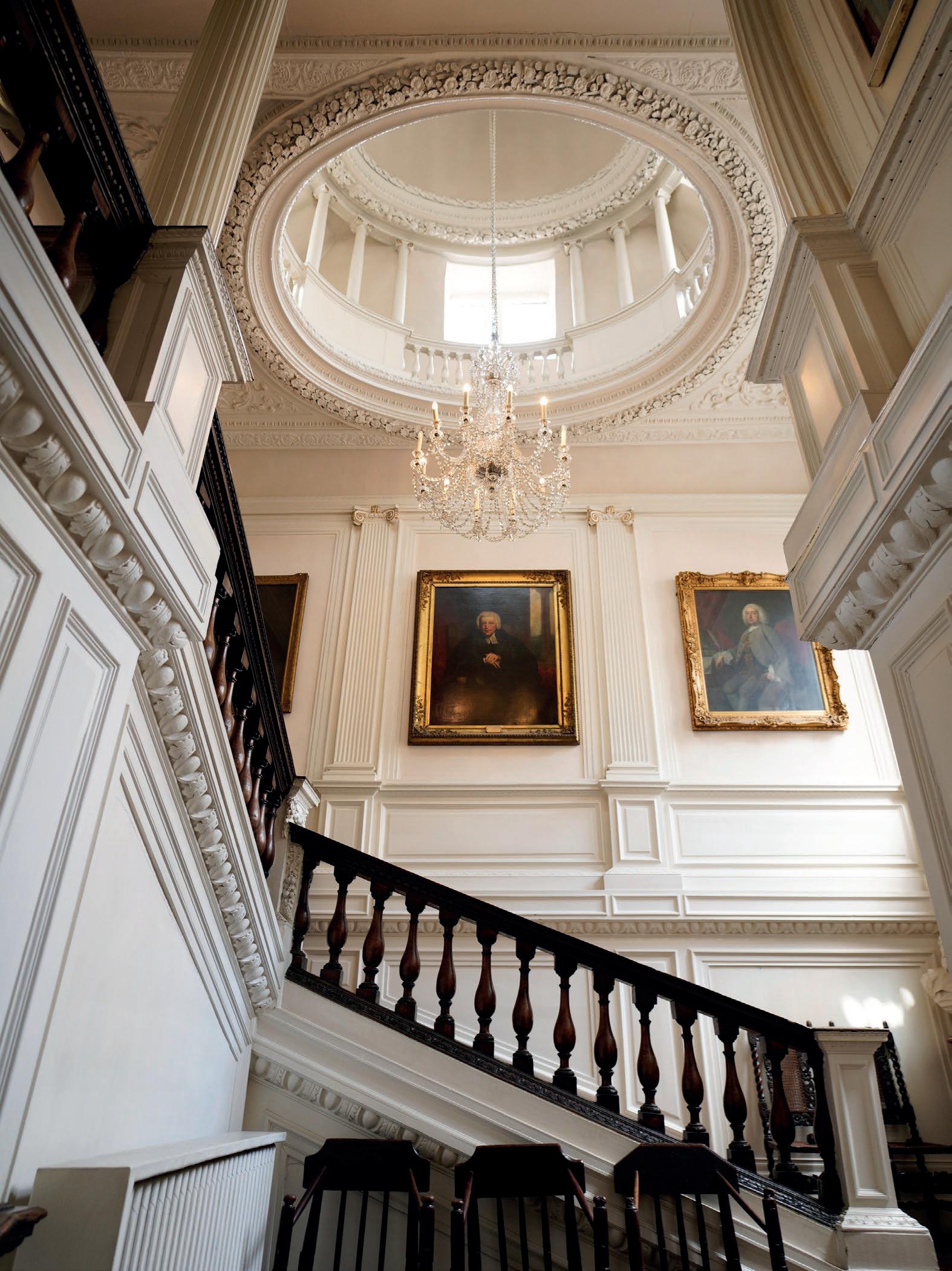
He subsequently divided his time between consulting to a range of
clients including state and federal agencies and Foxtel. He worked as an Adjunct Professor at the University of Technology in Sydney, where he developed a major research project exploring the future shape of television.
He also championed the use of broadcast and streaming media to further lifelong learning.
All the while he indulged in a rich intellectual life. From Wagner opera at the Salzburg festival, to Bach cantatas in Leipzig, and always a book in hand.
Indeed, there was a problem for the regular guests at his home. There was never anywhere to put your drink down … every available surface was covered in books and not just one deep but teetering piles of books. His erudite reviews were published in Australian Book Review.
In his final years he would succumb to Lewy Body disease. In what would be a cruel end, that brightest of minds slowly slipped away.
He is survived by his wife Trish Richardson, his brother Will, and sister-in-law Margaret and her family. Originally printed in the Sydney Morning Herald
42 The Elizabethan Newsletter
The Development Office Westminster School 17a Dean’s Yard London SW1P 3PB +44 (0)20 7963 1113 alumni@westminster.org.uk














































































